












Welcome to the eleventh edition of North Yorkshire’s Promoting Wellbeing and Independence Guide for Adults. This 2022/23 edition will provide you with information on health and social care across the county. North Yorkshire County Council is pleased to be working with the Independent Care Group to promote this Guide.
We want people in North Yorkshire to be independent, part of their community and to enjoy the best possible quality of life for as long as possible. Fundamental to enabling you to make the right decisions about care and support is high-quality information and advice. This Guide is one way of providing information, but we will continue to work with our partners to improve the range of information available. We are working closely with our health colleagues to join up health and social care services to give the best community-based care when it is needed.
North Yorkshire has its own online directory, which has information about thousands of local groups and activities across the county.
North Yorkshire Connect allows you to access information about community and voluntary organisations online. You can search the directory by categories such as ‘advice’, ‘health’ and ‘activities’ or you can put in your location and see what is available in your community.

standards in the care provided to people in North Yorkshire. New regulations for registered residential, nursing and domiciliary services focus very much on improving outcomes for adults who need support. These changes will underline the importance of people who use care services having a say and being able to make decisions about how to keep healthy and get the right care and support. We will also continue to have a strong commitment to safeguarding those adults who may be at risk of experiencing abuse or exploitation.
Even though the whole country has had to make some difficult financial choices, we remain committed to providing good-quality help and care. Whatever your circumstances, whether you pay for your own care or not, you can contact North Yorkshire County Council for information, advice and guidance. Where it is appropriate, we will ask our own social care staff to help you or to contact other services that may be of assistance.
We know that making decisions about social care can be daunting, particularly if you have not been involved with social care before. This Guide provides clear and easy-to-understand guidance so that you can be confident you are making the right decisions.
Web: www.northyorkshireconnect.org.uk
We also work closely with the Care Quality Commission’s (CQC’s) inspectors and with care providers to make sure we maintain high quality
County Councillor
Michael Harrison Executive Member for Adult Services and Health IntegrationCounty Councillor
Andrew Lee Executive Member for Public Health, Prevention and Supported Housing Richard Webb Corporate Director, Health and Adult ServicesNeither North Yorkshire County Council nor Care Choices can be held liable for any errors or omissions. The inclusion of advertisements for homes and agencies in this Guide does not act as an endorsement or recommendation by North Yorkshire County Council.
Customer Service Centre
Tel: 01609 780780
Web: www.northyorks.gov.uk
With so many providers to choose from, where do you start?
North Yorkshire Council, a single new council for everyone in North Yorkshire, will start in April 2023, replacing the current county council and seven district and borough councils.
The new authority will bring together all the best of the existing council services, working in close partnership with City of York Council to unlock a devolution deal for York and North Yorkshire. If agreed, this would see money and powers move
On behalf of the Independent Care Group (ICG), I am delighted to support this latest edition of the North Yorkshire Promoting Wellbeing and Independence Guide for Adults and hope that you find the information in it useful.
If you are beginning your journey towards finding a care package that is right for you or your loved one, the good news is that you will have the choice of quality care of all kinds and in all combinations.
We are so fortunate that the local area can boast a whole army of exceptional, warm and dedicated people with the motivation and enthusiasm to help you and your family go on enjoying life together.
We have an ever-changing landscape in social care, and it can be hard for those looking to use services to keep up. That is why this Guide is such an invaluable tool in helping find the care package that is right for your family. It sets out all the different types of care available in this area, as well as how to
from central Government to our region.
North Yorkshire Council will be also launching a new website from April 2023. This means that the website links used in this Guide to signpost to council services will be subject to change from that time. Use the other contact details provided where possible or call the Customer Service Centre on: 01609 780780 for the latest information.
access that care and how to fund it.
With people’s care needs becoming ever more complex and the services offered by providers changing to meet those demands, it has never been more important to look at all your options when considering the support you need. Once you have identified your choices, always pay a visit to the care services to help you to decide. Don’t forget you can also find important information about care providers by looking at their latest inspection report from the regulator, the Care Quality Commission (CQC).
For our part, the ICG is the regional body responsible for representing and supporting local independent care providers, both private and voluntary. For over 20 years, we have been actively helping care providers to deliver quality and safety of care for older and vulnerable people.
Around 80% of social care in this area is provided
assistance with your search for care
by the independent sector. That includes residential care, care provided to people in their own home, supported living, extra care housing and day care. We work with North Yorkshire County Council, City of York Council, the local clinical commissioning groups and the CQC, to try to ensure that the care provided matches the care required.



We’re here to help, so, if you’re a provider, please do get in touch or visit our website at:














www.independentcaregroup.co.uk or call: 07368 844027.











We are proud of the care provided by the independent care sector in this area and hope that, with the help of this Guide, you will find the support you and your family need.

 Nick Swash Chief Executive Independent Care Group
Nick Swash Chief Executive Independent Care Group

The information in this Promoting Wellbeing and Independence Guide for Adults has been compiled in conjunction with the Health and Adult Services Directorate of North Yorkshire County Council. We used to be known as ‘social services’.
When the words ‘we’ and ‘us’ are used in the Guide it means Health and Adult Services. Lots of people will pick up this Promoting Wellbeing and Independence Guide for Adults looking for advice and information about adult social care. The Guide aims to give an overview of all aspects of adult social care to everyone who is looking for care and support.
If you are thinking about care and/or support, either for yourself or a loved one, it’s true that it can be a challenging task.
Looking for care in your area? Want to know the quality rating of providers you’re considering? Care Choices, publisher of this Guide, has a website providing comprehensive details of care providers as well as essential information.
You can search by postcode, county or region for care homes, care homes with nursing and home care providers that meet your needs across the country.
Your search can be refined by the type of care you are looking for and the results can be emailed to you.
Making any change in your life will require major decisions and we are trying to provide you with the basic information and guidance you will need in this Guide and give you the details of other organisations that may be able to help. In the first instance, you can always call North Yorkshire County Council’s Customer Service Centre for advice on: 01609 780780 or email: social.care@northyorks.gov.uk
North Yorkshire has its own online community directory which you may find useful. North Yorkshire Connect: www.northyorks.gov.uk (search ‘community directory’) offers local information from community and voluntary organisations that can provide advice and support. It also lists activities and things to do.
The results can also be saved and emailed to others.
The website includes detailed information for each care provider, including the address, phone number and the service’s latest CQC inspection report and rating (see page 76), indicating the quality of care provided.
You can also view an electronic version of this Guide on the site and have it read to you by using the ‘Recite Me’ function.
Visit: www.carechoices.co.uk
Looking after our health and wellbeing is key to ensuring that we feel good, live well and enjoy life. There is a range of services and support to help you to make changes to your lifestyle.
The Public Health Team at North Yorkshire County Council provides a range of information on health and wellbeing online.
Visit: www.northyorks.gov.uk/health-and-wellbeing
Drugs and alcohol
Find advice and support related to alcohol or drug use:
www.northyorks.gov.uk/drugs-and-alcohol
Find out about skin awareness and sun exposure risk, the risks to health from climate change and avoiding infection:
www.northyorks.gov.uk/health-and-environment
Find information and support if you have a learning disability: www.northyorks.gov.uk/learningdisabilities or see page 62.
Find out about reducing the risks of developing cancer, diabetes or heart disease as well as treatments for these conditions. You can also find out how to help yourself to stay healthy: www.northyorks.gov.uk/long-term-conditions
Dementia
Find support for people living with dementia and advice on what to do if you think you may have dementia: www.northyorks.gov.uk/dementia or see page 64.
Find out about winter health, fuel poverty, falls prevention and healthcare for older people: www.northyorks.gov.uk/older-people

Find advice and information on sexual health, information on contraception and how to access STI testing including support for chlamydia and HIV: www.northyorks.gov.uk/sexual-health
There is a wide variety of support schemes and organisations in North Yorkshire which may be able to help or advise if you are struggling to pay for essentials:
• The North Yorkshire Local Assistance Fund (NYLAF) – provides emergency financial support to those unable to meet essential living costs. NYLAF can also make awards in kind, such as supplying basic necessities or household goods such as a fridge. Visit: www.northyorks.gov.uk/local-assistance-fund
• Warm and Well North Yorkshire – apply for hardship funding or help with minor repairs to make your home warmer. Call: 01609 767555 or email: wnw@northyorkslca.org.uk
• Council Tax reduction and support scheme –
Find out about eating healthily and maintaining a healthy weight, sleeping well and good oral health: www.northyorks.gov.uk/staying-healthy-one-you
Find advice and information about how to quit smoking, including details of self-help tools and free local support from Living Well Smokefree: www.northyorks.gov.uk/stopping-smoking or see page 14.
Find out about how to look after your mental health and where to find support: www.northyorks.gov.uk/mental-health or see page 64.
Find out how to reduce your risk of developing health problems with an NHS Health Check: www.nhs.uk (search ‘NHS Health Check’).
Better Health – Healthier Families: www.nhs.uk/healthier-families NHS website, The: www.nhs.uk
if you’re on a low income or claim benefits, you can apply for a reduction in the Council Tax you pay. Visit: www.gov.uk/apply-council-tax-reduction to check your eligibility.
There is a wide range of schemes across North Yorkshire to help you get where you need to be so that you can access services in the community.
You can find out more about community transport in your area on the Go Local website: www.golocal-northyorks.community
Further details regarding transport in North Yorkshire are available at: www.northyorks.gov.uk/public-transport
Demand responsive transport
Demand responsive transport is pre-booked transport that uses taxis or minibuses to provide transport to areas that are not served by conventional bus services.
We are working closely with community transport operators to increase the availability of these lifeline services where public transport is not available. Details of the demand responsive services that operate in the county can be found at: www. northyorks.gov.uk/demand-responsive-transport
YorBus is our new, flexible and on-demand bus service connecting the pilot area of Ripon, Masham, Bedale and surrounding villages. You can find further details at: www.northyorks.gov.uk/yorbus
There are two main types of bus pass available.
Older people of pensionable age are entitled to free off-peak travel on local bus services anywhere in England.
Disabled people are entitled to free off-peak travel on local bus services anywhere in England.
You must meet one or more of the following criteria, provide supporting evidence and include this with your application:
• Be blind or partially sighted.
• Be without speech.
• Not have arms or have long-term loss of the use of both arms.
• Be profoundly or severely Deaf.
• Have a learning disability.
• Have a disability or have suffered an injury which has a substantial and long-term adverse effect on your ability to walk.
• Have been refused an application for a driving licence due to physical fitness, not including the misuse of drugs or alcohol.
You can apply for a bus pass for a companion to travel with you if you are disabled and meet the eligibility criteria. Your companion need not travel with you on every journey or be the same person each time. They cannot use the pass without you.
You can check whether you are eligible for a bus pass, and apply or renew your bus pass, by visiting the ‘Bus Passes’ section on the North Yorkshire County Council website: www.northyorks.gov.uk/bus-passes
The national Blue Badge scheme helps people with severe mobility problems who travel as drivers or passengers to park close to their destinations. For more information about the scheme, including how to apply or renew a badge, visit: www.northyorks.gov.uk (search ‘blue badge parking permits for disabled people’).
You can apply for, or renew, a blue badge online. If you are not able to use our online form or you need assistance accessing information outlined in this section, please call your local North Yorkshire library where you can make an appointment for a library assistant to support you or contact our Customer Service Centre on: 01609 780780. A list of libraries in North Yorkshire starts on page 80.
for further assistance with your search for care
Darlington
Bradbury House, Beaumont Street West DL1 5SX
Tel: 01325 362832 (general enquiries) or 01325 357345 (information and advice).
There’s lots of local support available to help you to stay independent and living well. Review the organisations listed in this section and visit the North Yorkshire Connect website (www.northyorkshireconnect.org.uk) for even more organisations that can provide support.
Advocacy
Advocacy Alliance
Office 28, The Street, Scarborough YO12 7PW Tel: 01723 363910
Email: office@advocacyallianceyorkshire.org.uk
Web: www.advocacyallianceyorkshire.org.uk
Cloverleaf Advocacy
Fifth Floor, Empire House, Wakefield Old Road, Dewsbury WF12 8DJ
Tel: 01609 765355 • Text: 07860 021502
Email: referrals@cloverleaf-advocacy.co.uk
Web: www.cloverleaf-advocacy.co.uk
Carers’ services
For more information about carers’ services in North Yorkshire including contact details, see page 44.

Dementia support services
See page 64 for more information about dementia and local services.
Dementia Forward
Supporting people affected by dementia across North Yorkshire.
Tel: 0330 057 8592 (helpline).
Email: info@dementiaforward.org.uk
Web: www.dementiaforward.org.uk
Other contacts
Age UK North Yorkshire and Darlington
A local, independent charity committed to delivering quality-assured services and activities to older people.
Web: www.ageuk.org.uk/northyorkshiredarlington
Northallerton
Office is currently closed, but support is still available by phone and in the community.
Tel: 01609 771624
Richmond
Garget Walker House, 25a Olav Road DL10 4PU Tel: 01748 327155
Healthwatch North Yorkshire
Making sure your views on local health and social care services are heard.
Tel: 01423 788128 • Email: admin@hwny.co.uk
Email: admin@hwny.co.uk
Web: www.healthwatchnorthyorkshire.co.uk
Independent Care Group (ICG)
The ICG is the regional body responsible for representing and supporting local independent care providers, both private and voluntary.
Tel: 07368 844027
Web: www.independentcaregroup.co.uk
Independent Domestic Abuse Services (IDAS)
If you or someone you know is directly affected by domestic abuse, IDAS can provide further information and support.
Tel: 0300 011 0110 (helpline).
Email: info@idas.org.uk • Web: www.idas.org.uk
Medequip
Provides the Community Equipment Service commissioned by local NHS Integrated Care Boards (ICBs) and North Yorkshire County Council. See page 20 for more information.
Knaresborough
Unit 2, Manse Lane HG5 8LF (open 8.00am to 5.00pm, Monday to Friday).
Tel: 01423 226240
Email: north.yorks@medequip-uk.com
Scarborough
5B & 5C, Dunslow Court, Eastfield YO11 3XT
(open 9.00am to 5.00pm, Monday to Friday).
Tel: 01423 226240
Email: north.yorks@medequip-uk.com
Abuse is when somebody does or says things to a person that harms them or makes them feel upset or frightened. It is mistreatment by somebody or some people that violates a person’s human and civil rights.
Anyone could be at risk of abuse or neglect. A person may be vulnerable at different times in their life. Some adults may be more at risk because they are older or have a sensory impairment, a disability, a mental health condition or a long-term illness. Some people may have difficulty in making their wishes and feelings known which may put them at risk of abuse or neglect and they may not be able to make decisions or choices without support.
An adult at risk is a person aged 18 or over who has needs for care and support (whether or not the local authority is meeting any of those care and support needs), and as a result of those care and support needs is unable to protect themselves from either the risk of, or the experience of, abuse or neglect.
Adult safeguarding is defined as ‘protecting an adult’s right to live in safety, free from abuse and neglect’ (Care and Support Statutory Guidance, Chapter 14). Adult safeguarding is people and organisations working together to prevent and reduce both risks and experiences of abuse and neglect.
There are lots of different types of abuse, including:
• Physical abuse – someone being hit, slapped or kicked, being locked in a room or restrained inappropriately.
PALS offers confidential advice, support and information on health-related matters. It provides a point of contact for patients, their families and their carers. You can find PALS officers in your local hospital.
Web: www.nhs.uk (search ‘what is PALS?’).
• Sexual abuse – someone being made to take part in sexual activity when they haven’t given consent or are not able to give consent.
• Emotional or psychological abuse – someone being shouted at, bullied, being made to feel frightened or pressurised into decisions.
• Financial abuse – stealing, fraud, withholding or misusing someone’s money or possessions.
• Neglect and acts of omission – includes not giving someone the care that they need.
• Modern slavery – human trafficking and forced labour.
• Domestic abuse – when abuse occurs between partners or by a family member.
• Discriminatory abuse – poor treatment or harassment because of someone’s age, gender, sexuality, disability, race or religious belief.
• Organisational abuse – inflexible systems and routines in place that stop people making their own choices about their lifestyle; not considering a person’s dietary requirements; inappropriate ways of addressing people.
• Self-neglect is also a form of abuse – this is when someone chooses not to look after themselves. It might include not eating or refusing help for their health or care needs and this has a significant effect on their wellbeing.
Abuse may be an isolated incident or repeated incidents. It may be that the abuse is deliberate, or it may be unintentional; due to ignorance or lack of training and understanding. It may be that a person is at risk of abuse or being abused in several ways.
It can happen anywhere – at home, a care home, a hospital, in the workplace, at any service you attend, at college, in supported housing or in the street.
Adults at risk provide sensitive information and have the right to expect that this information and information obtained from others will be treated respectfully and that their privacy will be maintained.
The challenges of working within the boundaries of confidentiality should not stand in the way of taking appropriate action. Whenever possible, informed consent to the sharing of sensitive personal information should be obtained.
Who might cause abuse?
Abuse can be caused by anyone, it may be somebody you know well, or it may be a stranger. It may be more than one person. It might be a family member, a friend, a neighbour, a carer or care worker, a nurse, a social care worker, a GP, a visitor to your home or a rogue trader. If you live in a residential setting or receive any other services, it may be another user of that service, a visitor or a care worker.
What should you do if you are worried about abuse?
North Yorkshire County Council has a legal duty to protect the rights of adults with care and support needs to live in safety, free from abuse and neglect. Together with other partners, including health and the police, North Yorkshire County Council operates a zero-tolerance attitude towards all forms of abuse. All adults should be able to live their lives free from fear and harm.
If you or the person you are concerned about is in danger and immediate action is required, you should ring the Emergency Services on: 999.
If you or the person you are concerned about is not in immediate danger, you should ring our Customer Services Centre on: 01609 780780. This is a 24-hour service.
You will be able to speak to an experienced adviser who will listen to your concerns, take them seriously and treat you with dignity and respect.
You will be offered support and your concerns will be directed to a specialist worker who will arrange to meet with you.
You may have a relative, friend or independent advocate present if you wish. Together, you will discuss the issues and agree a plan to keep you as safe and independent as possible. We want to help you to reach the outcome you want and ensure you are aware of your options.
We may involve other agencies to help support you safely, but we will agree this together. Where the abuse is a crime, the police need to be involved to prevent other people from suffering as well. We will jointly help to support you. If you are worried about contacting the police, you can contact us to talk things over first.
What should you do if you are worried about someone in a care home?
If your concern is about someone who is in a care home, refer to the Customer Service Centre.
Customer Service Centre
Tel: 01609 780780
For further details, visit: www.northyorks.gov.uk/safeguardingadults
If you have concerns about the standards or application of regulations in a care home, you should contact the Care Quality Commission.
Care Quality Commission
Tel: 0300 061 6161
Email: enquiries@cqc.org.uk
What should you do if you are suspicious that Modern Slavery is happening near you?
If you believe a person is being subject to Modern Slavery, report to the police on: 101 or in an emergency where there is immediate threat, call: 999
You can also call the Modern Slavery helpline: 0800 012 1700 (open 24/7), report online at: www.modernslaveryhelpline.org/report or call anonymously via CrimeStoppers on: 0800 555 111.
Living Well Coordinators (LWCs) work with people in need to reduce loneliness and isolation, increase participation and support you to be independent.
Living Well aims to improve the health, wellbeing and independence of adults. Our coordinators work with individuals and their carers who are isolated, vulnerable, bereaved, lacking confidence or perhaps on the borderline of needing health and social care services.
To prevent the need for statutory support, we help people access their local community and support them to find solutions to their health and wellbeing goals. This helps to reduce loneliness and isolation and prevents or resolves issues for people, including hospitalisation.
Living Well can support adults who are not currently eligible for ongoing social care support and who:
• Are lonely and/or socially isolated.
• Have had a recent loss of a support network, including bereavement.
• Have had a loss of confidence due to a recent change or event.
• Require face-to-face information, advice and guidance.
• Need some support to find or maintain employment.
This may be people who need a little extra help to overcome some of life’s challenges and changes: people who have a caring role, who are frail or physically disabled, people with a learning disability or autism or people with mental health problems or sensory impairments.
LWCs will spend time with individuals on a one-to-one basis. LWCs will:
• Talk to you and find out more about what support is required.
• Help you to think about areas of your life that you would like to change.
• Work alongside you and listen to what help you may need.
• Support you to make simple changes to manage your health and stay well.
• Support you to plan what you need to do to make those changes and help you to achieve your goals in an agreed time frame.
Some types of support that LWCs provide include:
• Support to build self-confidence.
• Support with practical advice and skills.
• Advice on healthy living and signposting to lifestyle services such as exercise or stopping smoking.
• Help to get online either in the home or using a universal/community service, such as a library or cybercafé.
• Help to become a volunteer or to access community activities.
• Helping a person to be connected to, linked with or signposted to a voluntary agency for support or a more specific support network such as befriending, shopping, transport, advocacy and more.
When you contact us, an adviser will refer you to the Living Well team if you meet the requirements for the service.
For more information, call our Customer Service Centre on: 01609 780780
Social Prescribers (also known as Link Workers) work alongside GPs and other members of the primary care health team. You can ask your GP to refer you
to a Link Worker in its practice, if you would like to have a conversation about ways to access activities and support to improve your health and enjoyment
Living Well Smokefree is a stop smoking service provided by North Yorkshire County Council. Living Well Smokefree has a team of experienced stop smoking advisers, offering face-to-face support as well as remote interventions via telephone and video conferencing.
Interventions include behavioural and motivational support and access to stop smoking medications such Nicotine Replacement Therapy. The service also offers advice and support around e-cigarettes and can help with access to Zyban in partnership with your GP. General stop smoking support is also available through GPs and pharmacies that have signed up to deliver the service.
All clients referred to the service will undergo an eligibility check against the following criteria:
• Would like to stop smoking and receive support from the service.
• Is not receiving stop smoking support from another provider.
• Is above the age of 12.
• Is a tobacco smoker that resides in North Yorkshire, works in North Yorkshire or is registered with a GP in North Yorkshire.
Any potential client who does not meet all these criteria will not be eligible to access Living Well Smokefree.
Why would you stop smoking?
Here is what can happen after your last cigarette:
• 20 minutes after your last cigarette – your pulse returns to normal.
in life, such as art activities, group learning, gardening, debt counselling, housing and other practical support.
• Eight hours after your last cigarette – your oxygen levels are recovering and harmful carbon monoxide in your blood has halved.
• 48 hours after your last cigarette – your body has flushed out all carbon monoxide and your lungs begin to clear out the waste. Also, your smell and taste improve.
• 72 hours after your last cigarette – your breathing feels easier, and you feel more energetic.
• Up to 12 weeks after your last cigarette – your blood is pumping to your heart and muscles better due to improved circulation.
• Three to nine months after your last cigarette –your lungs are working 10% better and you are coughing and wheezing less.
• One year after your last cigarette – your risk of a heart attack has halved compared to a smoker.
• Ten years after your last cigarette – your risk of death from lung cancer has halved too.
• 15 years after your last cigarette – your risk of heart attack is the same as somebody who has never smoked.
With the right support, you are three times as likely to stop smoking for good.
If you would like to access the service, refer somebody else, assist somebody to self-refer, or you would like any further information about Living Well Smokefree, use the following contact details.
Living Well Smokefree
Tel: 01609 797272
Email: stop.smoking@northyorks.gov.uk
Web: www.northyorks.gov.uk/stopping-smoking
www.myfamilyourneeds.co.uk
For parents and carers of children with additional needs and those who support them.
We want people to stay living in their homes for as long as possible and we know that many people want to be surrounded by their possessions, near to their family and friends. This applies to anyone, whether they are older, recovering from an illness or addiction, have a physical or learning disability, have
Assistive Technology or Technology Enabled Care (TEC) uses a range of remote equipment matched to your personal needs. This helps to increase, maintain or improve functional capabilities, enabling you to live as independently and safely as possible. The equipment can be linked to a monitoring centre, to family and friends or to other technology devices in the home. Assistive Technology is used in a variety of circumstances to help people with a broad range of needs.
Different types of Assistive Technology products can be simultaneously used in an individual’s own home to:
• Enable you to live a healthier, independent life for longer.
• Enable you to live safely at home.
• Prevent or delay unnecessary hospital or care home admissions.
• Support you to return home from hospital or a care setting where possible.
• Provide technology-based solutions to complement other community services.
Our Assistive Technology services are delivered in several ways:
• A financially competitive, private pay Assistive Technology offer is available to all people within the county. This includes Assistive Technology equipment which can purchased and responded to by family, friends or carers. This can be arranged directly with NRS Healthcare on: 01904 221473 (option three).
• Assistive Technology can also be provided as part of our reablement service for a short period
a mental health condition or are living with dementia.
The following section gives you some information about the support that is available to you in your home.
of time. This will enable its appropriateness and effectiveness to be captured in order to plan long-term provision.
• Assistive Technology can form part of your long-term support plan and Personal Budget dependent upon assessment and eligibility.
Some examples of how Assistive Technology can be used are:
• To call a monitoring centre which can keep a phone line open to you in an emergency. For example, following a serious fall.
• To alert you when temperatures in your property get too high or low. For example, if the cooker hob has been left on or if you forget to use your central heating.
• To remind you to lock your door.
• To alert family or friends if you leave your property at unusual times of the day.
• To allow you to remain independent whilst knowing that you have technology to keep you safe or to allow you to complete tasks and activities.
Assistive Technology works 24 hours a day, 365 days per year by providing real-time alerts or calls when equipment is activated.
Assistive Technology typically alerts a monitoring centre where trained operators are dedicated to this service. Operators can speak to you, will have your details and know who to call in an emergency. This could be family, friends, carers, a community response service or the emergency services if required.
For further information about Assistive Technology, or to refer for an assessment where applicable, contact our Customer Service Centre
Tel: 01609 780780
Web: www.northyorks.gov.uk
Occupational Therapists (OTs) and other specially trained workers can give you advice and assess your needs and those of carers.
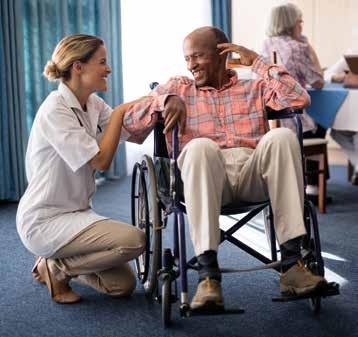
There are many types of equipment that can help you to live independently at home. Depending on your circumstances, our Occupational Therapy service can recommend equipment that enables you to carry out daily living activities such as bathing, washing, dressing and getting around your home. It may be as simple as fitting a grab or banister rail in the right place to help you get up and down steps more safely and independently or you may need equipment to help you with getting in and out of bed or using the toilet.
North Yorkshire County Council has an online self-assessment tool called ‘AskSARA’ which can identify ways of helping you with daily living activities in your home. To find out more, visit: www.northyorks.gov.uk/advice-and-supporthelp-daily-living
It is important to get the right advice and support before you buy any equipment. You will find several mobility aids and equipment providers in your local community who can discuss basic equipment with you to ensure that it meets your needs.
Medequip
Medequip provides the Community Equipment Service commissioned by local NHS Integrated Care Boards (ICBs) and North Yorkshire County Council. The service provides both health and social care equipment and includes:
• The returning and recycling of equipment. For more information, visit: www.medequip-uk.com/contact/north-yorkshire
Alternatively, to arrange Assistive Technology privately, please contact NRS Healthcare who deliver the service in partnership with North Yorkshire County Council on: 01904 221473 (option three) or visit: www.nrstelecare.co.uk/northyorkshire
• Information and advice for North Yorkshire residents about both independent living and the Community Equipment Service.
• A self-purchase service (purchasing products before or in addition to those potentially provided by health and social services). Medequip has an online store at: www.manageathome.co.uk
• Signposting to the Disabled Living Foundation’s AskSARA website. For more information, visit: https://medequip.livingmadeeasy.org.uk
Medequip Knaresborough
Unit 2, Manse Lane HG5 8LF (open 8.00am to 5.00pm, Monday to Friday).
Tel: 01423 226240
Email: north.yorks@medequip-uk.com
Medequip Scarborough
5B & 5C, Dunslow Court, Eastfield YO11 3XT (open 9.00am to 5.00pm, Monday to Friday).
Tel: 01423 226240
Email: north.yorks@medequip-uk.com
The Home Improvement Agency handyperson service for your area provides a range of preventative services including minor jobs/ adaptations such as:
• Odd jobs – such as replacing light bulbs, securing loose carpet or putting up shelves or flat-pack furniture.
• Adaptations – providing and fitting grab rails and external handrails, fitting of second banister rails and larger jobs such as building a step to improve accessibility.
• Security – fitting window locks, security chains, key safes, doorbells and door locks.
• Help with accessing benefits or grants to fund work.
• Energy efficiency advice.
If you have difficulty accessing areas within your home, have a permanent or long-term health condition and need an adaptation to help you stay independent, you may be eligible for a grant from your borough or district council (called a Disabled Facilities Grant or DFG
The grant is assessed according to your needs and circumstances. Following a financial assessment, you may qualify whether you are a homeowner or a tenant. However, if you are eligible for funding through a Disabled Facilities Grant, you may still have to pay a contribution towards the cost of the adaptation/s.
Disabled Facilities Grant adaptations are only provided to meet an assessed need when the local authority deems the work as ‘necessary and appropriate’.
• Free access to a ‘safe traders’ list of approved contractors, helping you to avoid rogue traders.
Whether you own or rent your property, you may qualify for funding for some or all the adaptation work dependent on an assessment.
Yorkshire Housing Home Improvement Team Web: www.yorkshirehousing.co.uk (search ‘adaptations’).
White Rose Home Improvement Agency For all Scarborough, Whitby and Ryedale areas.
Tel: 01723 232323
Web: www.scarborough.gov.uk/white-rosehome-improvement-agency
submitting plans, building regulation applications, obtaining quotes, overseeing work, ensuring it is completed to the required standard and that it is ‘reasonable and practicable’. The Home Improvement Agency can carry out the work and or support the approved contractor/s.
For more information about DFGs in your local district, visit the following relevant website and search ‘Disabled Facilities Grant’.
Hambleton District Council Web: www.hambleton.gov.uk
Richmondshire District Council Web: www.richmondshire.gov.uk
Harrogate Borough Council Web: www.harrogate.gov.uk
Facilities Grants can be found at: www.foundations.uk.com
Each district area in North Yorkshire provides a technical service to support people with their Disabled Facilities Grant. This includes drawing and
Craven District Council Web: www.cravendc.gov.uk
Selby District Council Web: www.selby.gov.uk
White Rose Home Improvement Agency For Scarborough, Whitby and Ryedale areas. Web: www.scarborough.gov.uk
If you’re having difficulties with everyday tasks at home, these simple solutions could make life easier and keep you independent. These are a starting point; other solutions are available which might better suit your needs.
Finding it difficult to get in and out of chairs? Try putting a piece of hard board under the seat base. Alternatively, buy chair raisers, a higher chair or an electric riser chair. Also try taking regular gentle exercise to improve your mobility.

If you can’t reach your windows, could you move furniture out of the way? Ask someone to help if you need to move heavy furniture. There are also tools for opening and closing windows.
Struggling to keep warm/cool? Consider a fan or heater. Is your house insulated? Are there any draughts? You may also be eligible for the winter fuel payment from the Government. Visit: www.gov.uk/winter-fuel-payment
If you have trouble using light switches, think about replacing your switches for ones that are easier to use. Consider handi-plugs or light switch toggles, or there’s even technology available so that you can turn your lights on and off using your speech.
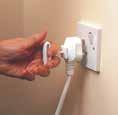
Use subtitles if you can’t hear the TV or buy wireless headphones. Do you need a hearing aid? Request an assessment from your council.
Do you forget to take your tablets? Try making a note of when you’ve taken them, or buy an automatic pill dispenser or pill box. If you struggle to open your medicine, you can ask your pharmacist for advice on alternative packaging that could make it easier for you.
Can you reach everything in your cupboards? If not, try a handi-reacher or rearrange your kitchen so the things you use most are within easy reach.
If you are having problems with preparing food, consider buying ready-chopped options or try a chopping board with spikes. There are also longhandled pans, teapot tippers and lid grippers that could help. Palm-held vegetable peelers or a food processor might be a solution and meal delivery services are also available.


Is eating and drinking becoming difficult? Large-handled cutlery could help, or non-slip mats for the table. Lightweight cups and mugs with two handles could also be a solution.
Using taps can be made easier by fitting tap turners. You could also consider changing to leverstyle taps which might be easier for you to use.

More information on staying independent and ideas to help you live at home can be found online at: www.carechoices.co.uk/staying-independent-at-home/ There is also information on making larger adaptations to your home.
If moving whilst in bed is a problem, have you thought about using an over-bed pole? You might also want to buy a pillow raiser or change your bedding so it’s lighter.
Is it becoming difficult to get dressed? If so, specially adapted clothing is available, or you could buy a long-handled shoe horn, a dressing stick or a button hook. If you are having a lot of difficulty, consider home support, see page 25.

Clocks are available with large numbers or lights if you can’t read the time in bed. You can also buy clocks that speak the time.
If you are finding it harder to read in bed, consider an e-reader that allows you to change the font size. Some also have integrated lights. Look for bedside lamps with a step-on or button switch if yours are difficult to use.
Do you struggle to get in and out of bed? You could learn new ways of moving around, purchase a leg lifter or a hoist or install grab rails for support. Seek advice about these options. If the bed is the issue, you could buy an electric adjustable bed or raise the bed to the right height.


If it’s hard to hold your toothbrush, try a toothbrush gripper. You might also benefit from having an electric toothbrush or sitting on a stool while brushing your teeth.

You might like to buy a raised toilet seat, or a seat with a built-in support frame if it’s hard to use your toilet. Flush lever extensions are also available.

Has it become more difficult to wash? Items are available, like long-handled sponges and flannel straps. You could also consider a slip-resistant bath mat, grab rails, a half step to help you get in and out of the bath or a bath or shower seat. Tap turners can also be used in the bathroom.
If you think you need an assessment, please call our Customer Service Centre on: 01609 780780 or email: social.care@northyorks.gov.uk
If you would like some advice and guidance to help you make informed choices about how to meet your care and support needs, you can complete an initial assessment online at: www.northyorks.gov.uk/needsassessment
Medequip work with North Yorkshire County Council and the NHS to provide assistive living equipment in your area. Medequip also provide a retail service for those who wish to purchase or rent equipment themselves.

Social Value is important to us:
• We give our employees paid leave to volunteer
• We work to increase the recruitment of disabled and disadvantaged people

If you would prefer to return equipment to Medequip yourself, you can bring it to our distribution centres or amnesty bin locations.
Find your nearest return location:
• We donate equipment and raise funds for charities mq-uk.com/return-nyorks

We suggest you consider the following questions before buying any Assistive Technology. If you are in any doubt about what technology might help meet your needs, you can contact your council or visit: https://northyorks.livingmadeeasy.org.uk
You can download and print this checklist at: www.carechoices.co.uk/checklists
Does the equipment support your specific needs?
Are you willing to use it?
Will it fit into your everyday life and routine?
Have you tried a demo of the equipment?
Do you understand what the equipment is for?
Do you need to take it with you when you leave the house? Is it transportable?
Does the equipment have any limitations that would make it unsuitable for you?
Will it work alongside any Assistive Technology you already have?
Is a simpler piece of equipment available, e.g. a pill case rather than an automated pill dispenser?
Does the equipment need a plug socket, and will its wire cause a trip hazard?
Is it easy to use? Can you read/hear it clearly and are any buttons big enough for you?
Are you able to use it? Are there any aspects you don’t understand?
Is it portable?
Will it need to be installed by a professional?
Can the retailer provide you with training in using the equipment?
Will it work if you have pets or live with other people, e.g. could someone else set off a sensor alarm by accident?
Have you read reviews of the particular piece of equipment you are looking at? Consider these before making your purchase.
Can you speak to someone who already uses it?
Does it require batteries? Find out how often they will need changing and whether the equipment will remind you to do this.
Is it durable? If you might drop it, is it likely to break?
Do you know how much it costs?
Will you need to pay a monthly charge?
Are there alternative solutions that might be free?
Is there a cost associated with servicing the equipment?
Occupational Therapy provides practical support to facilitate recovery and overcome barriers preventing people from doing the activities (or occupations) that matter to them.
This support can increase people’s independence and satisfaction in all aspects of life (RCOT, 2019). For more information, visit: www.rcot.co.uk
The way you access these services in North Yorkshire will depend on why you need Occupational Therapy.

If you have a short-term condition, for example, if you need support following an operation, you will access services through the NHS, and you should speak to one of the healthcare professionals treating you. They will discuss your needs with you and decide if you would benefit from Occupational Therapy and, if so, will arrange an assessment with an Occupational Therapist (OT) as part of your care.
The Health Occupational Therapy service covers hospital stays and returning home. It provides a specialist therapeutic service, including assessment, treatment and ensuring a safe discharge back home after hospital admission.
For ongoing difficulties in your home due to your health, Occupational Therapy can be accessed through your local council. You should contact our Customer Service Centre on: 01609 780780 to arrange a needs assessment with an OT. Or you may be referred to another health or social care professional, whoever is more appropriate.
If you do not want to access Occupational Therapy through the NHS or North Yorkshire County Council, you could contact an OT directly.
If you decide to see a private OT, make sure they are fully qualified and registered through the Health and Care Professions Council (HCPC) and are a member of a recognised body, such as the Royal College of Occupational Therapists: www.rcotss-ip.org.uk/find
Only healthcare professionals who are registered with the HCPC can use the title of ‘Occupational Therapist’. You can see if your OT is registered by checking the HCPC online register: www.hcpc-uk.org
An OT can carry out an assessment to identify what areas of your everyday life are causing problems. They will discuss your needs with you and explain what help is available. An assessment and any advice or information provided by a Health or local authority OT should be free; services resulting from this assessment may be chargeable. A private OT may charge you for any assessment, information or services.
We no longer have direct involvement in arranging, delivering or subsidising meals on wheels services. However, we have identified several organisations across the county which can provide meals to people in their own homes.

You can discuss directly with providers the type and number of meals per week that you would like. Payment is agreed directly with the meal providers.
You can also find details of local businesses who offer food deliveries and takeaways and other products and services in your local area on Buy local. Visit: www.northyorks.gov.uk/buy-local
Dinners 4 U
Tel: 0113 287 7090
Web: www.dinners4u.co.uk
Oakhouse Foods
Tel: 01904 948949
Email: york@oakhousefoods.co.uk
Web: www.oakhousefoods.co.uk
Parsley Box
Tel: 0800 612 7225
Email: care@parsleybox.com
Web: www.parsleybox.com
Wiltshire Farm Foods
Tel: 01845 578784
Web: www.wiltshirefarmfoods.com/contact-us
www.carechoices.co.uk
With
• Find care providers quickly and easily
• Search by location and care need
• Information on care quality
• Links to inspection reports
• Additional information, photos and web links
Hambleton & Richmondshire

Ainderby Hall, Ainderby Steeple, Northallerton DL7 9QJ 01845 440271
Ainderby Hall, Ainderby Steeple, Northallerton DL7 9QJ 01845 440271
hambletonandrichmondshire@bluebirdcare.co.uk
hambletonandrichmondshire@bluebirdcare.co.uk
liveincare@hamandrich@bluebirdcare.co.uk
liveincare@hamandrich@bluebirdcare.co.uk


Help at home is also known as ‘home care’ or ‘domiciliary care’ and is usually arranged according to need. All service providers, except those delivering domestic support only, must be registered by the Care Quality Commission (CQC) which publishes reports and quality ratings following an inspection.
You must ensure that all care workers have Disclosure and Barring Service (DBS) checks, have received necessary training, are properly referenced, and are eligible to work in the UK prior to visiting your home. Check CQC reports and quality ratings at: www.cqc.org.uk or call: 0300 061 6161.

Getting help at home can take many forms. The list of local providers beginning on page 31 may offer:
• Practical support – to assist with household chores such as shopping, cleaning and assistance with food preparation. Calls from care workers can be flexible and can last as little as 15 minutes when you need it.


• Domiciliary care – in addition to practical support, this involves personal care (assistance with washing, dressing etc.), and/or one or more care workers to assist with mobility. You may wish to have a care worker sleep in your home overnight for security and reassurance.
• Live-in care – a care worker lives in your home, is allowed time off each day and must have a night’s sleep. It can be arranged as a short respite for your main carer or a permanent arrangement to suit your needs.
• 24-hour care – when you need assistance or monitoring 24 hours a day. It differs from live-in care in that care workers rotate to ensure that someone is awake and working both day and night.


Maintaining independence and quality of life is key to ageing wellHome Instead provides personalised care tailored to your individual needs:

Home Help
Companionship
Personal Care
Rehab and recovery
Dementi
Live-in C
To arrange care, please contact our specialists:
- For Harrogate, Ripon or Thirsk: 01423 774490
- For Ilkley, Skipton or Settle: 01943 662188
- For Northallerton or Richmond: 01609 801650
- For York, Ryedale or Scarborough: 01904 221719
- For Wetherby or North Leeds: 01937 220510
Agency 1
Agency 2
Agency 3
We suggest that you have paper with you when speaking with home care agencies so you can make notes. You can download and print this checklist at: www.carechoices.co.uk/checklists
How long has the agency been operating?
How long are staff allocated per visit?
Can you contact the agency in an emergency or outside office hours?
Does the agency have experience with your specific needs?
Staff
Are you likely to be visited by different staff each day?
Are all staff checked with the Disclosure and Barring Service?
Will you be notified in advance if your care worker is on holiday or sick?
Are staff matched to you specifically, based on your needs and preferences?
Can you meet your care worker(s) before they start?
Does the agency have both male and female staff?
Can the agency accommodate your needs if they increase? Ask about the process for this.
Does the agency have a training scheme in place?
Are all staff trained to a certain level?
Are staff able to help with administering medication if required?
Is there a way for staff to communicate with each other about the support they provide when they visit you? How?
Regulation
Will your support plan be reviewed at regular intervals?
Can you see the agency’s contract terms?
Can you lodge a complaint easily?
Are complaints dealt with quickly?
Can you see a copy of the agency’s CQC registration certificate and quality rating?
*See page 76.
Following



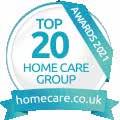


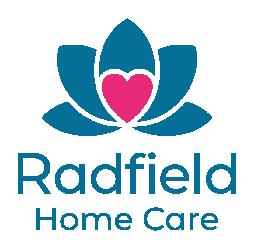
Radfield Home Care has been providing care and support throughout North Yorkshire since 2018. For four years it has been recognised as one of the Top 20 home care providers in the country and is one of the North Yorkshire region’s few Living Wage care providers.

“Many older people significantly reduced the time they spent outdoors, within their local communities over the last couple of years, and have become heavily dependent on their loved ones to support them. However, with families and friends returning to the workplace and their pre-covid daily routines, it is increasingly difficult for family members to sustain this support, leaving older relatives feeling isolated and nervous.”
Radfield Home Care Harrogate, Wetherby & North Yorkshire director, Matthew Nutting.
“Our services are here to support a range of activities and help older people regain their independence and become connected once more with their local community, friends and social lifestyles many of us depend on. From personal care, to food shopping, to days out at National Trust properties - our Care Professionals are qualified to be there for your loved ones as we look ahead to life after lockdown.”
Radfield Home Care York, Thirsk & Ryedale’s director, Ed Gill.
If your loved ones are struggling after the last two years of lockdowns, contact Radfield Home Care to find out how it can support them to regain their independence and age well.

Harrogate, Wetherby & North Yorkshire Office
01423 608 760
harrogate@radfieldhomecare.co.uk
www.radfieldhomecare.co.uk/harrogate
Radfield Home Care Harrogate, Wetherby & North Yorkshire, Suite 1 Tilcon House, Low Moor Lane, Lingerfield, Knaresborough, HG5 9JB
York, Thirsk & Ryedale Office
01904 530 118
york@radfieldhomecare.co.uk
www.radfieldhomecare.co.uk/york
Radfield Home Care York, Thirsk & Ryedale, Unit 3a Centurion Office Park, Tribune Way, York, YO30 4RY
A reliable, professional service available across Harrogate, Craven, Bradford and Airedale. We aim to provide a caring responsive, person-centred, support package, including:


• Bathing and showering
• Meal preparation
• Shopping
• Light cleaning
• Adhoc holiday cover
• Carers’ breaks
• Social outings
• Taking to health appointments
We provide a range of services which promote enjoyment, independence, wellbeing, respect, dignity, equality, diversity, opportunity and choice, ensuring users’ and carers’ rights come first. Our tailormade support is based on a comprehensive assessment of the individual’s needs.
PROVIDING CARE FOR ALL
Telephone: 01274 588990
Email: care@carersresource.org
Web: care.carersresource.org
Through years of providing quality care and meeting the needs of our clients, we are proud to provide an exceptional care service to ensure you can continue to live the life you love in your own home


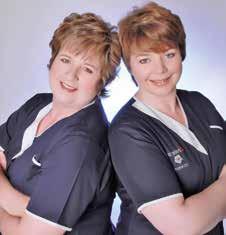
We have vast experience working with members of our community of all ages living with sensory impairments, physical and learning disabilities, and those who require specialist Dementia Care
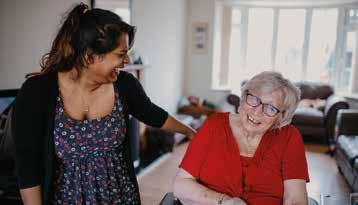

Our staff are chosen by us for their kindness, compassion and their ability to “go the extra mile” to support you.
Professional feedback: “I love working with this provider, they are so open and really have got people’s best interest at heart.”
“The staff are so caring whatever you need, it is done”
Brightening Lives Ltd
Burlington Homecare (North Yorkshire)
Buttercup Home Care T/A Visiting Angels Harrogate
Camphill Village Trust – Botton Village
Care @ Carers Resource
Care Designed For You
Care For All
Care Services Thirsk Ltd
Care Solutions North Yorkshire Ltd
Selby
0161 882 0404
Carefound Home Care (Harrogate) Harrogate
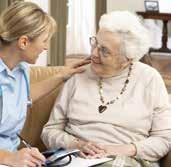

Esteem Homecare is a flexible & caring social enterprise with a mission to support people to live an independent life in their own home. We do all we can to adjust our service to match your unique needs. We regularly recruit passionate staff with or without experience to join our dynamic team. With Esteem you are guaranteed that your rights and choices will be respected.
A LOCAL COMPANY ESTABLISHED OVER 30 YEARS AGO. PROVIDING QUALITY CARE TO ADULTS IN RYEDALE WITH BRANCHES IN PICKERING AND MALTON
We are CQC registered GOOD at both locations. Our experienced managers will be happy to help to assess your individual needs and our well-trained staff are on hand to help meet your care needs.

• Personal Care
• Social Support
• Medication Management
• Palliative Care
• Supporting people living with Dementia
• Flexible home visits based on the demand posed by your needs
• Live-in service
• 24 hour care for complex needs and End of Life Care
• Fast response to emergency calls in-between visits if you make a request
• We can cover your main carer so they can have a break
• Support to promote independence and choice
• Fast track hospital discharge home
• Non-Regulated Practical based services
Tel: 01642 913281
Tel: 01642 248196
Mob: 07565 602959
We offer: E: esteemhomecareservices@gmail.com

We offer a variety of services to help individuals maintain their independence and retain choice in their lives. We work closely with Healthcare Professionals and provide care on behalf of the NHS and North Yorkshire County Council and for Self-Funding service users.
Malton Branch 01653 695549
info@eldercaremalton.co.uk
www.eldercareryedale.co.uk

“Elderflower Homecare is an exceptional home caring service, way beyond anything I could have ever imagined. The pressure and worry you took from me I will be forever grateful”
Elderflower Homecare is a small family run business that provides client centred, high quality care to enable people to lead a fulfilling life in their own home.



All our staff have extensive knowledge and expertise for adults with dementia or a physical disability.
We allocate a limited number of carers per client to achieve a personal approach.


l Medication
l Personal Care
l Meal Preparation
l Companionship
l Domestic Duties
l Dog Walking

l Daily Living Equipment
l Specialist Dementia Care
l Holiday & Respite Care
l Shopping
Contact us for more information:
Tel: 01423 324 325
Email: elderfloweroffice@gmail.com
Web: www.elderflowerhomecare.co.uk
Helping Hands are here to help with those chores you find difficult to do yourself. Our aim is to keep you in your own home, where you feel most comfortable for as long as possible.
Quality
Tel: 01653 498007
Email: admin@helpinghandscare.co
At Happy Futures we provide outstanding support for individuals with learning disabilities, autism, mental health and complex care needs in a fun, motivating, safe and caring environment. We focus on outcome-based support, providing domiciliary care, outreach and supported living options.
Get
Tel: 01723 586633
Email: info@hfss.org.uk
We offer support to individuals with:


• learning disabilities
• profound and multiple disabilities
• sensory impairments
• hidden disabilities
• Autism
• Asperger’s Syndrome
• complex and enduring mental health needs
• long term health conditions
• acquired brain injuries
• conditional discharges
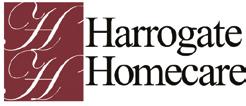







Helping Hands Domiciliary Care Ltd
Hollins
A family run business that focuses on offering the best possible standard of personal care and support so you can stay in the comfort of your own home.
We understand our field and with over 30 years success you are in safe hands. “Listening and understanding is the key to our success, it’s very daunting when you realise you need extra help to continue living in your own home. Where do you start? We offer a smile and warmth to help you make the transition and find a care plan that embraces your independence and safety”
Wendy Kneller- Co-ownerOur expert team deliver a personalised homecare service to you.


We appreciate that everyone has different needs and requirements, so we can create a care plan that works for you and your family’s needs.
What we offer:
• A morning call to help you, or loved one, get up, washed, showered or bathed. This may also include preparing breakfast.
• An evening call to help get ready for bed and prepare dinner.
• An overnight stay to support you through the night. This may also include morning or end of day assistance discussed above.
• A call to assist with washing, laundry, shopping, meal preparation or any other assistance you would like through the day.
• Support with social activities such as attending appointments, visiting family or friends, or simply going for a walk with good company.
• Companionship and medication support.
Priory Supported Living Whitby & Scarborough
Prospect House Community Care Office
Radfield Home Care Advert pages 28 & 29
Rainbow Outreach and Healthcare Solutions Ltd
Ripon and District Homecare

Sova healthcare is passionate about care in the community and totally committed to delivering high standards of quality care. We have been rated as ‘Outstanding’ in ‘care’ by the Care Quality Commission and have been approved by North Yorkshire Council as an approved provider to serve the local area including Ripon and rural Harrogate. We deliver outstanding homecare services in your home.

Not only will you receive ‘Outstanding’ care for your loved ones but expect the best from all Sova Healthcare employees. We tailor the care package to suit you and your family. Our emphasis is on a holistic approach to care from outstanding care workers who have been vetted thoroughly.

Home care
Support with shopping and cleaning
Respite care
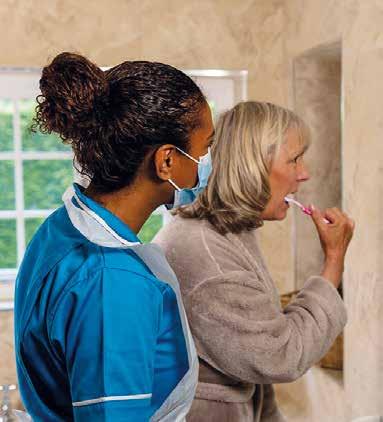
24-hour live-in care
Complex care needs
End of Life Care
Waking night
Companionship
Sova care has been looking after members of my family for 9-months now. I can not recommend them highly enough. They looked after my relation all through his illness, and he got his wish to pass away at home with dignity and respect. Living over two hundred miles away and not being able to get up, all the time due to Covid, knowing the Sove care team were looking after him and his wife, took a lot of the stress out of it for myself and the rest of the family. After he died, the team have carried on looking after his wife; the carers are just that, caring, reliable and helpful in every way, nothing is to much trouble. My cousin looks forward to seeing them every day.
Susan F (Cousin of Client)The care I receive is extremely supportive and help me with daily life. I would not be able to get to appointments without their help. The team really go the extra mile to find additional time for my appointments. The continuity of care for my outings is appreciated.
We support with personal care, medication, shopping, preparing meals, cleaning and getting out and about. We also offer companionship and support with looking after people who have Dementia or Palliative care. We take away the the stress so you feel more at ease in your own home.
Delivering just ‘Outstanding’ care isn’t easy, but Sova healthcare is different and offers a unique and totally fresh approach to care.


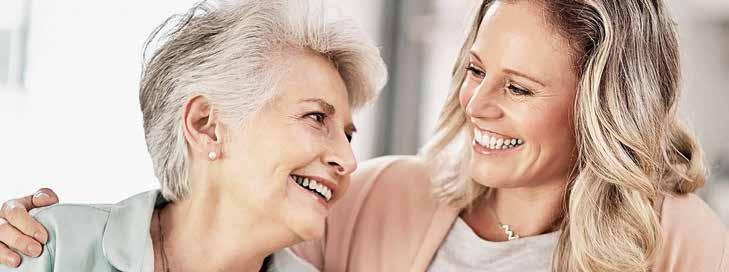


Adult carers are people aged 18 or over who offer regular help to someone who has issues relating to ageing, illness, disability or substance misuse and are not employed to provide such care. We can provide advice and support for adult carers, both for the person cared for and direct to the carer.
Trained staff in our Customer Service Centre will help carers identify what they may require and who to contact. Our staff can put carers in touch with specialist social care staff. These specialists can visit the carer, or the person who is being cared for, to look at what extra help may be needed.
We may also be able to support carers with:
• A carers’ assessment, this can help carers think about what is important to them and ensure that they get the support they need. This could be in the form of a Personal Budget. See page 46 for information on carers’ eligibility.
• Information, advice and guidance for carers about looking after their own health and wellbeing and support to connect to opportunities in their community.
• Help for carers who may need support to continue working and caring from our Living Well or Supported Employment services, both of which can also provide support with accessing training and employment.
• A carers’ emergency card which will identify a person as a carer if they have an accident or are unable to identify themselves, so that the person being cared for will receive support in an emergency.
• Information about respite care that can give carers a break from caring.
There are many organisations in North Yorkshire that support carers. The local carers’ support services provide practical and emotional support to carers locally.
Some of the services offered include:
• Confidential information, advice, emotional support and representation.
• Benefits advice.
• Regular information by way of circulars, bulletins or newsletters.
• Referrals to other specialist support organisations.
• Information sessions, courses and other related activities including carers’ support groups.
• Help for carers who need support to continue working and caring.
• Young carers’ services for young people who care for a relative, offering one-to-one support, clubs and new opportunities.
The local carers’ support services also work in partnership with carers, carer groups and other organisations to improve services for carers and promote their interests.
These are the local carers’ support services in North Yorkshire: www.northyorks.gov.uk/carer-supportgroups-and-organisations
For the latest information, visit the website above or contact the Customer Service Centre on: 01609 780780 or email: social.care@northyorks.gov.uk
Carers Plus Yorkshire
Email: admin@carersplus.net
Web: www.carersplus.net
Hambleton and Richmondshire
2 Omega Business Village, Thurston Road, Northallerton DL6 2NJ Tel: 01609 780872
Scarborough and Ryedale
96 High Street, Snainton YO13 9AJ Tel: 01723 850155
Carers’ Resource
Call the Carer Advice Line listed adjacent.
It’s a direct line to a carer support worker who knows about caring responsibilities and the support available both from Carers’ Resource and from other organisations and agencies. The line is open between 10.00am and 4.00pm, Monday to Friday. Outside of those times and during office hours, if the on-call support workers are busy, you will be put through to the normal office line.
Tel: 0808 501 5939
Email: info@carersresource.org
Web: www.carersresource.org
You may have a carer living with you, or perhaps living nearby who helps you regularly. Caring for someone can be a huge undertaking and carers sometimes need a break. This may be provided in several ways. You may wish to go into a care home for a week or two or a specialist short-term break facility. You could have home-based respite care, where another carer (or a trained care worker) moves into your home to care for you, or you could have family-based respite care where you move into another family’s home for a period.
We can also refer carers to ‘sitting services’. These are short breaks for carers where you will be supported in your own home or out doing something you enjoy, allowing your carer to go out or just take a rest for a couple of hours. These services can be accessed following a carers’ assessment and are designed to be on the day and time that is most suitable for you and your carer. These services can also be accessed directly by individuals and through referrals from adult social care, local carers’ support services and GPs.
The best option will depend on your needs, the urgency of the situation, personal choice and cost. If you are thinking about long-term care but have no experience of a care home, you could book a short stay to see what it is like. This will give you some experience of residential care to make an informed decision. If you have nursing needs, you may be eligible for a contribution to your fees – see ‘Care homes with nursing’ on page 67.
However, we would like you to contact us, so that
Harrogate
Unit 3, Grove Park Court, Grove Park Terrace
HG1 4DP
Tel: 01423 500555
Skipton
Ronaldsway House, 36 Brook Street BD23 1PP
Tel: 01756 700888
Selby
Community House, Portholme Road YO8 4QQ
Tel: 0808 501 5939
we can help you consider whether this is the best option or whether other types of help in the home would be appropriate for you.
We offer respite care to people who meet our eligibility criteria. To access this, you and your carer will need to have an assessment. The assessment will take your wishes into account, as well as the needs of your carer.
It is still worth having a carers’ assessment even if your carer does not think that they would benefit from a respite service. The assessment could result in you or your carer receiving different types of support.

The amount of respite available will depend on individual assessments but it is important to note that resources are limited. Carers’ circumstances will be assessed against the eligibility criteria described on page 49.
If you would like to arrange a carers’ assessment, visit: www.northyorks.gov.uk (search ‘carers’ assessment’). You can also contact the local carers’ support services in North Yorkshire starting on page 44, or you can email: social.care@northyorks.gov.uk or call: 01609 780780.
If you need to contact us to ask for help and support for the first time, you will be asked to complete a care and support initial assessment, which asks questions about your situation.
The most convenient way to do this is online or, if you are unable to go online, you can contact the Customer Service Centre where advisers will complete the initial assessment with you over
An assessment is your opportunity to have a conversation with a social care professional about what a good life looks like for you and your family and how it can be achieved.
We will help promote your interests and independence, enabling you to identify your needs, how they impact on your wellbeing and the daily outcomes you wish to achieve. We will record this information on an assessment form which you will receive a copy of.
We will usually visit you at home, but sometimes in hospital, a central community venue (sometimes known as a hub) or at a location of your choice. For example, a relative’s home.
We will talk to you about what services, facilities and resources are already available in the area, such as local voluntary and community groups, and how these might help you. We will ask you how you’re managing everyday tasks like washing, dressing and cooking. We will go at a pace that suits your personal circumstances. If you are worried about having your assessment all in one go, let us know and we can split it into smaller visits.
Anyone can request an assessment which is free, even if you are likely to have to pay for the full cost of your care. We recommend you have an assessment before purchasing care as there may be solutions that enable you to remain independent for longer. For more information, visit: www.northyorks.gov.uk/needsassessment
the telephone and point you in the direction of help and support that you can access for yourself, or to the Living Well Team (see page 13 for more information regarding Living Well). If we think that you might need information and advice from a professional, or care and support services, you will be referred to a member of staff who will have a conversation with you to agree what will happen next.
Social care staff should always involve you and respect your right to make your own decisions. Social care staff should also give you any support you need to express your views and wishes. This might include:
• Communication aids – such as pictures, symbols, large print, Braille or hearing loops.
• Support from an advocate and/or interpreter.
• Extra time to understand the conversation.
• Making the conditions right to help you communicate, such as reducing background noise and providing good lighting.
If you find it difficult to express your views and wishes, you might want to ask a family member, carer or someone who knows you well to be with you during the conversation.
If you don’t have anyone to support you, let us know and we can give you information on accessing an advocate. See page 74 for information about advocacy.
We can help to promote your wellbeing in several ways. There is no set approach, and how this happens will depend on your needs, goals, aspirations and wishes and how these impact on your wellbeing. Every person is unique, and we will support you as an individual and, during the conversations we have, will consider with you the most relevant aspects of your wellbeing and how your needs impact upon them.
While an assessment is free of charge, there may be a charge for services provided; for a full description about charging for services, see the information titled ‘Paying for care’ beginning on page 50.
‘A service to help you become more independent’.
The council’s Reablement Team can support you at home to do things for yourself. The team will support you to maximise your independence by helping you to maintain or re-learn the skills needed for everyday life, such as managing your personal care independently or preparing a meal. Reablement may be useful for you if you are returning home after treatment in hospital or you are not managing at home as well as you did.
Your reablement plan lasts from a few days to a few weeks and is tailored to you individually, supporting you to achieve your goals. Many people who receive reablement find that afterwards they can cope very well on their own, without the need for ongoing social care support. If they do need ongoing support, they may find that they need less.
You can start the assessment process by completing the care and support initial assessment online at: www.northyorks.gov.uk/needsassessment or, if you are unable to go online, contact the Customer Service Centre on: 01609 780780
Reablement workers may suggest that you carry out some tasks in a slightly different way to make them easier for you to do on your own and can suggest equipment which could make your day-to-day living easier. You may have to purchase small pieces of equipment, or we may be able to provide it in some situations.
We will advise on local services you may be interested in and encourage everyone to take up the use of Assistive Technology and Lifelines (see page 15 for more information).
As part of your reablement plan, we will help you to plan any ongoing care that you might need and whether any charges will apply. For more information on financial assessments and paying for care, see page 50.
•
With so many providers to choose from, where do you start?
•
•
•
•
This section is about the guidance, support and care that we can provide.
It describes all parts of the social care process, from
Within North Yorkshire, we work very closely with the NHS to ensure that people in hospital are discharged safely and can return to home life as quickly as possible. Our Discharge Hub social care staff can help with information and advice when you are ready to leave hospital.
No matter which hospital you are in, you can request an assessment of your needs to help you stay independent and confident when you return home. If you have social care needs upon discharge, our NHS colleagues will help to determine where is the safest place for you to be. This may include supporting you to leave hospital with a temporary stay or providing support with care at home. Once you leave hospital, a member of our Social Care Team will visit you to offer a further assessment to determine your long-term care needs.
The assessment involves asking you about your needs, the outcomes you want to achieve and how we can support you to maximise your
Home from Hospital is for people aged 18 and over living in North Yorkshire who are being discharged home and would benefit from some support.
The Home from Hospital Team and volunteers ease the process of settling back home by helping to resolve potential issues, such as anxiety.
Support can be provided for up to six weeks, depending on an eligibility assessment. Over this period, the team can assist in re-building confidence and independence. Visits are usually weekly and last up to one hour.
someone who might be leaving hospital worried about how they are going to cope at home, to advice about specialist care for someone who might have very complex needs but wants to stay at home.
independence to help you live safely and independently at home. There will also be an explanation of any charges that may be made. If there is a cost, the exact amount will be determined based on a financial assessment. A relative, carer, or a member of the hospital staff may also approach the hospital Social Care Team and ask them to carry out an assessment, but this will not go ahead unless you agree.
If you already have a social care service in place, we will assess any other needs you may have and review these against the outcomes you want to achieve after your stay in hospital.
If you have a carer, they can also be offered an assessment and advice and support. A social care worker can discuss any issues and give details of carers’ support groups. We can also introduce you to local voluntary organisations that can help with a variety of services such as laundry and domestic cleaning or sitting services.
The team can make an initial home visit to discuss any immediate concerns and needs. The support provided will vary according to individual circumstances.
For more information, visit:
www.carersresource.org/post-hospital-services and select ‘For North Yorkshire’.
www.myfamilyourneeds.co.uk
For parents and carers of children with additional needs and those who support them.
There is a national eligibility threshold for long-term care and support, which is the same across England. It consists of three criteria, all of which must be met for your needs to be eligible for support from us. The eligibility threshold is based on finding out:
• Whether your needs are due to a physical or mental impairment or illness.
• To what extent your needs affect your ability to achieve two or more outcomes.
• Whether and to what extent this impacts on your wellbeing.
After your assessment, we will explain whether you are eligible for care and support from us. If you have eligible needs and want our help to arrange services to meet them, we can discuss this with you.
If you are eligible for social care support from us, we will complete a financial assessment to understand whether you will need to pay towards some or all of the cost of the support. This will depend on your income and any savings you may have. See page 50 for more information on financial assessments.
If your level of needs means that you are not eligible for support from us, we will offer free advice and information and put you in touch with other organisations and services in your community that may be able to help you. This could be face-to-face, over the telephone, in writing or a combination of these, whichever you feel would best meet your needs. You may find useful services and organisations at: www.northyorkshireconnect.org.uk
A carer is someone who, without payment, provides help and support to a friend, neighbour or relative who could not manage otherwise because of frailty, illness or disability. Just like adults with care and support needs, we will offer carers an assessment to see whether they have needs eligible for local authority support. Visit: www.northyorks.gov.uk/eligible-needs-carers
A carer will have eligible needs if they meet all the following:
• Do the needs arise because the carer is providing necessary care and support?
• Is the carer’s physical or mental health affected or at risk of deteriorating, or is the carer unable to achieve any of the specified outcomes?
• Is there consequently a significant impact on the carer’s wellbeing?
Again, if a carer does not meet the eligibility criteria, we will offer free advice and information and put them in touch with other organisations and services in the community that may be able to help, including services specifically aimed at supporting carers. This could be face-to-face, over the phone, in writing or a combination of these, whichever they feel would best meet their needs.
The Care Act helps to improve people’s independence and wellbeing. It makes clear that local authorities (in this case North Yorkshire County Council) must provide or arrange services that help prevent people from developing needs for care and support or delay people deteriorating to the point that they would need ongoing care and support. The Care Act 2014 sets out in one place, local authorities’ duties in relation to assessing people’s needs and their eligibility for publicly funded care and support. If you would like more information about the Care Act, please see the Department of Health and Social Care’s guidance at: www.gov.uk (search ‘care and support statutory guidance’).
If your needs change, you can always ask us for a reassessment. Simply speak to your social care worker or contact our Customer Service Centre by emailing: social.care@northyorks.gov.uk or calling: 01609 780780
For further information, visit: www.northyorks.gov.uk
Most people will have to pay something towards the cost of their care.
Before we talk about paying for care, it is important that we have a discussion with you to identify and establish any care and support needs that you have (see page 46 for more information). This is so that we can help and advise you on a solution that supports you to remain independent and save you from paying for more care than you might need. This section will give you some information so that you can feel more confident when you are thinking about the care options that are right for you or the person you care for.
In most cases, if you are eligible for support, we will provide you with a short period of intense care and support in your home. This is the reablement service discussed in more detail on page 47. During this period, we might also provide you with specialist equipment, for example, a Lifeline service.
When we are asked to consider providing financial assistance towards social care and support services, we will require evidence of your finances. If, because of reviewing these, we believe that you and/or your financial representative has deliberately deprived you of any asset and/or capital with the intention of avoiding paying for your care and support, we will assume that this capital or other asset is still available and will charge you accordingly.
To work out how much you will need to contribute to the cost of your non-residential care, we will carry out a financial assessment, sometimes called a ‘means test’ which entails a specialist benefits and assessments officer visiting you at your home, or another agreed location. Sometimes, we may be able to complete the financial assessment by post, email, telephone or by using our online facility. When the initial discussion takes place regarding any care and support that we may be able to provide you with and the related financial assessment, the options will be explained to you in more detail.

You can arrange for someone to be with you when the assessment is completed if you want to. The officer will ask you to give details of your financial circumstances, including details of your income, outgoings and capital. Examples of these are as follows.
This could be your:
• State retirement pension.
• Private pension.
• Disability benefits and some other benefits.
• Interest from investments.
It does not include any earned income such as wages.
This could be money going out, such as rent, mortgage, Council Tax and water rates.
When we carry out your financial assessment, we will need to see evidence of these costs.
The capital we look at is the money that you have. This could be:
• In the bank.
• In the building society.
• Shares.
• Investments.
• Equity in your home.
A financial assessment for home care does not include the value of your home. See page 53 for information on paying for residential care.

Our benefits and assessments officer will use these details to work out your assessable income and the amount of money that you may have to pay for services. Assessable income is the amount you have left after taking away certain outgoings and disability-related costs.
Generally, you will not have to pay anything for your care or support costs if your income is less than the appropriate level of income set by the Government each year, plus an additional 25%. Most people are likely to need to pay something towards the cost of their services. Contact us for more information.
Our Care Homes in North Yorkshire offer the highest quality nursing, residential and dementia care for your loved one who needs a little more care or looking for a respite care. Enjoy delicious food along with our “ by Maria Mallaband” lifestyle programme in beautiful surroundings. Whether you are looking for care in York, Ripon, Harrogate or Kirk Hammerton, we have a home for you.

If you have savings below £14,250, they are not considered when working out your charge for services. If you have savings over £14,250, these will be considered when working out your charge for services.
These figures may change in April every year.
During your financial assessment, we will talk to you about any additional expenses that you may have because of your illness or disability. We will ask you to provide evidence of the additional expenses, for example, receipts. These expenses may then be considered when we work out how much you have available to pay towards your services. The benefits and assessments officer will also make sure that you are receiving all the welfare benefits to which you may be entitled; they will help you to claim these if appropriate.
Everyone is likely to be asked to pay for some of the services we provide. For example, meals taken at a day centre or lunch club will be charged for and the amount is dependent upon the service.
The amount you pay for other support services will be calculated from your financial assessment. If you would like to check whether or not you may have to pay something towards the cost of any support we may provide, visit:
www.northyorks.gov.uk/financial-assessment/ This will give you an indication of any contribution. However, please do not let this prevent you from requesting social care and support.
You will be asked to pay the full cost of your service(s) if:
• Your capital is over £23,250.
• You decide not to tell us about your financial circumstances.
• You refuse to sign the financial assessment form.
If your capital is less than £23,250, we will look at:
• Your assessable income.
• The level of service you receive.
• Any capital that you have over £14,250.
• Any disability-related costs.
If you own assets with another person, only your share should be considered when deciding how much to charge. We should not consider assets owned by another person.
If you are part of a couple, we may undertake a financial assessment that takes into consideration the circumstance of your partner, to ensure that they are left with enough to cover daily living costs. We will consider the facts in each individual case, but we will always be careful to ensure that everyone has enough money to live on.
If you have any questions about this or disagree with the amount we ask you to pay, please ask the benefits and assessments officer who completes the financial assessment.
For more information about social care charges, contact your local Benefits, Assessment and Charging Team.
Central Team (Hambleton, Richmondshire and Selby). White Rose House, Thurston Road, Northallerton DL6 2NA
Tel: 01609 536010
Email: areafinanceadmin.central@northyorks.gov.uk
East Team (Scarborough, Ryedale and Whitby). Castle House, Elders Street YO11 1DZ
Tel: 01609 532700
Email: areafinanceadmin.east@northyorks.gov.uk
South Team (Selby, Sherburn and Ryedale). White Rose House, Thurston Road, Northallerton DL6 2NA
Tel: 01609 536010
Email: areafinanceadmin.south@northyorks.gov.uk
West Team (Harrogate, Ripon and Craven).
Jesmond House, 31/33 Victoria Avenue HG1 5QE Tel: 01609 532541
Email: areafinanceadmin.west@northyorks.gov.uk
Whatever your circumstances, we will not ask you to pay more than the cost of providing the services.
If your financial circumstances, care or support needs change, please contact your social care worker so that we can check if we need to reassess your contribution. If there is a change to your charges, our Benefits, Assessments and Charging Team will tell you. If your financial circumstances change and you don’t tell us, we may backdate your charges to the date of that change. A change in financial circumstances could mean a sudden increase in capital, sale of a property or a welfare benefits award that you have not told us about.
You will only pay for services you receive. If you do not receive any services for a while, for example, if you are in hospital, then you do not pay. It is important that you notify your social care worker if you are not receiving a service to ensure you are charged the correct amount.
If you cannot afford to pay, contact your local Benefits, Assessments and Charging Team straight away.
Will you qualify for assistance with funding your residential care?
The value of your home is included when assessing capital unless one of the following still lives there:
• Your partner.
• A relative who is over 60 or incapacitated.
• A child under 16 who you or a former partner maintain.
If you have capital or savings exceeding £23,250, arrange for an assessment with us to define your care needs.
If, apart from your property, your savings are less than £23,250, we can help with your care costs for the first 12 weeks. After this time, any money from us will be regarded as a loan and will need to be repaid once your house is sold.
If you have capital or savings of less than £23,250, we will share the costs with you.
To work out how much we will pay and how much you will pay, a meeting will be arranged with a benefits and assessments officer following your initial assessment.
The team will talk with you to try to identify a solution.
We will send you an invoice every four weeks for the services you receive. Charges are usually six weeks behind. This is because we need to wait for information from your provider regarding the services you have received and then work out your charge. We will print the dates of the care you are being charged for on your invoice.
Remember, if your partner still lives at home, they will not be means-tested. If you have a private pension, only half will be considered when you are assessed if you are passing this on to your partner. However, you will need to consider the effect this would have on any benefit claim your partner makes, as it may affect their entitlement to other financial help.
Remember to claim:
• Universal Credit (if you are under pension age).
• Pension Credit (if you are over pension age).
• Savings Credit (if you are over 65).
• Attendance Allowance (if you are over 65).
• Disability Living Allowance or Personal Independence Payment (if you are under 65).
As part of your financial assessment, the Benefits, Assessment and Charging Team will help you to claim these, if you are eligible. This will help you to pay towards any care and support you receive.
Moving into a nursing home? You may be eligible for the NHS Nursing Care Contribution (NCC); see page 54.
The benefits and assessments officer will review your care needs as laid out in your initial assessment and will assess your financial situation. If you have capital and savings between £14,250 and £23,250, you will be expected to contribute £1 per week for every £250 you have above £14,250 in addition to your assessed contribution from your income.
You may wish to seek independent financial advice to guide you through your financial options.
There may be several solutions to retaining your capital whilst paying for care (further information is available in the following section).
We can still support you if you are paying for your own care and support and we will be happy to complete an assessment of your needs. It is beneficial to speak with us about your care and support needs before you decide what care you are going to purchase. This will ensure that you choose an appropriate option to help you maintain your independence for as long as possible, and at a rate that is affordable.
It is important to know that if you choose a service that you are unable to afford long term, we may have to discuss alternative options with you, which can sometimes mean you having to change care provider.
There are lots of organisations that can give you advice about funding your care and support costs. You may find Money Helper useful: www.moneyhelper.org.uk
You may also benefit from seeking independent financial advice to support your decisions. If you do speak to an independent financial adviser, you need to be aware there may be a charge for this service.
We would recommend that the financial adviser is accredited by the Financial Conduct Authority (FCA) or is accredited with the Society of Later Life Advisers (SOLLA). To find an accredited member, visit: www.societyoflaterlifeadvisers.co.uk
If you are thinking about care options, you may be entitled to some of the following financial assistance and support, subject to a needs assessment.
If your former home is included in your financial assessment but your other capital is less than £23,250, and your income is not enough to meet your care home fees, we may help with the costs during the first 12 weeks of permanent care, provided we agree that care is needed. This is called a twelve-week property disregard period.
After the twelve-week property disregard period, any financial help from us will be charged against the value of your home and recovered once your
house has been sold or from your estate. This is called a Deferred Payment Agreement.
However, we may limit how much we will pay, and it may affect your entitlement to Pension Credit or Income Support if your property is not seen to be on the market and becomes treated as capital by the Department for Work and Pensions (DWP).
We will charge interest on Deferred Payment Agreements. There are also various other costs involved in setting up an agreement and for settling the agreement. However, these amounts will only ever be charged to cover our costs and not to make a profit.
These are examples of benefits that are non-meanstested, non-taxable benefits from the DWP paid at a standard rate for those needing care by day or night, and at a higher rate for those needing care both during the day and night.
Everyone who needs care can, and should, claim these benefits. If we are contributing towards the cost of your care for a permanent placement in a care home, then Attendance Allowance will stop being paid.
Disability Living Allowance (DLA) is a tax-free benefit. The rate you get comprises two parts. How much you get depends on how your disability or health condition affects you. DLA is no longer open to new claimants. Personal Independence Payment (PIP) is replacing DLA for people aged 16 until state pension age, even for those with an indefinite or lifetime DLA award. If you were 65 or over on 8th April 2013, you can continue to get DLA if you were already receiving it.
For further information, visit: www.gov.uk and search for ‘Disability Living Allowance’ or ‘Personal Independence Payment’.
Whether you are a temporary or permanent resident, if you live in a care home that provides
nursing care you may be entitled to a non-meanstested NHS NCC towards the cost of your nursing care. This is paid directly to the home.
NHS CHC is a package of continuing care that is arranged and funded solely by the NHS. This is free of charge, wherever it is delivered. NHS CHC support may be provided in a nursing or residential care home or in a person’s own home.
People eligible for NHS CHC will have been assessed as having a primary health need and are likely to have complex medical needs and substantial or intense ongoing care needs.
National guidance says that the NHS CHC assessment should be person-centred. This means that the person being assessed should be fully involved in the assessment process. They should be kept informed and have their views, needs and support considered. Carers should also be consulted where appropriate. It is a good idea for carers to make it clear that they would like to participate fully in the assessment process.
A decision about eligibility should usually be made within 28 days of a referral being made to the NHS Integrated Care Board.
Fees charged by some homes may be higher than the maximum rate that we can pay for someone with your level of needs. If we are funding your care and the home you choose costs more than this rate, you can choose someone else to make an additional payment.
This means that they will have to pay the difference between our rate and the amount the home charges. This additional payment is often referred to as a ‘top-up’ or ‘third party payment’.
The law says that you or your spouse or partner cannot make this additional payment, except in limited circumstances, such as when you have a Deferred Payment Agreement (explained on
If you are already receiving support from us, your social care worker will be able to give you more information about NHS CHC. An NHS CHC screening checklist can be completed with you, from which a referral for assessment can be made if you are entitled to it. Your GP or community nursing service should be able to give you advice or make a referral with you if you are not currently receiving support from us.
If you are waiting to hear whether you are eligible for NHS CHC, any services provided by us will continue to be charged and must be paid upfront. Any claim refunded by NHS CHC will be paid to you once the refund has been received and processed.
If your capital is likely to reduce to £23,250 because of paying for care, you must let us know well in advance as we may step in to help with your care fees. We must assess your care and support needs to determine whether we could contribute.
Understanding your rights before receiving formal care services is essential. There are several financial products and specialist companies who may be able to help. It is important to seek advice before committing yourself. There are details of some organisations that can help you with financial matters on page 54.
page 54). Therefore, the additional payment must normally be made by someone else. For example, a family member or charity.
Before anyone agrees to make additional payments on your behalf, they should be aware that the amount could increase, and they need to be confident that they can sustain the payments for as long as they are required. If the additional payments stop being paid, for any reason, then you should seek help and advice from us via our Customer Service Centre. See page 5 for contact details.
Once it has been established that someone is willing and able to make these payments, they will be asked to sign an agreement to formalise the arrangement.
If you or your carer are eligible for ongoing social care support, you will be entitled to a Personal Budget based on an assessment of your eligible social care needs.
A Personal Budget is defined in the Care Act as having three parts:
1. The overall cost to the local authority of meeting your needs (i.e. the eligible needs it is legally required to meet, or decides it needs to meet).
2 The amount payable by you (after you have had a financial assessment).
3 The net amount the local authority must pay to meet your needs.
Your Personal Budget is the amount of money it would cost to meet your eligible care and support needs. For example, any support or help to manage day-to-day activities and everyday tasks such as
Direct Payments are cash payments made to people assessed by North Yorkshire County Council as having eligible care and support needs. Direct Payments are available to most eligible people, including:
• People who have been assessed as needing short- or long-term care and support (including those with mental health needs) aged 16 and over.
• Carers over 16 for carers’ services.
• Parents of disabled children, for children’s services.
To help you stay safe and living well in your own home, you can use these payments to arrange your own care services, either by yourself or with assistance. Carers could also receive a payment to look after their own wellbeing that could help them to continue their caring role.
washing and dressing, help with eating and drinking or getting out in the community. You may need to make a financial contribution towards your Personal Budget depending on your circumstances; see page 50. Your Personal Budget allows you to choose what services you use, and when and how you receive them.
Your Personal Budget can be taken in several ways:
• Managed Personal Budget – you ask us to arrange and buy services on your behalf.
• Individual Service Fund – you ask a provider to hold and manage your Personal Budget and work with them to plan how it is spent.
• Direct Payment – you (or your nominated person) hold and manage the Personal Budget yourself. This gives you choice and control over how the money is spent to meet your assessed eligible needs.
You do not have to take your whole Personal Budget as a Direct Payment. You can choose to combine a Direct Payment with a Managed Personal Budget or Individual Service Fund to have services purchased and provided by us or an external service provider.
If you choose to arrange your own services via a Direct Payment; we will complete a financial assessment to understand whether you will need to pay towards some or all of the cost of your support. For more information about financial assessments, see page 50.
Direct Payments allow you more control over the decisions that affect your life. They provide more flexibility and choice over who, how and when you receive your support and means the providers you choose are accountable directly to you.
You can use a Direct Payment to pay for services, equipment or activities to meet your assessed eligible needs as long as they are legal and keep you safe and well. For example, you could use a Direct Payment to buy services from an agency or you could employ a personal assistant.
Using Direct Payments to arrange your own services means the providers you are accountable directly to you and not to North Yorkshire County Council.
Direct Payments do not count as income and will not affect your benefits.
You can use your Direct Payment creatively, as long as the money is spent to meet your needs and is used lawfully. The flexibility that these payments allow means it is impractical to outline how you can spend them. However, there are certain things on which you cannot use the money to pay for, for instance:
• Services that should be provided by the NHS.
• Routine living expenditures, such as utility and household bills.
• Permanent or long-term residential or nursing care.


• Employing a spouse, partner or other close relative, if that person lives with you in the same household.
• Anything that does not meet your agreed needs.
Most people use Direct Payments to purchase regular, ongoing support. However, we can also make a single payment. For example, a single payment could allow a person to purchase a piece of equipment to make their life easier or a short period of respite to give a carer a much-needed break from their caring role.
If you are interested in Direct Payments, call our Customer Service Centre on: 01609 780780 or email: social.care@northyorks.gov.uk
Through
So whether you are considering a career in care or you are a care provider looking for support with your recruitment needs please get in touch with the team on 01609 535585 or email makecarematter@northyorks.gov.uk
Find out how you can make care matter at www.makecarematter.co.uk
Extra care housing offers a way of supporting you to live independently for as long as possible. It provides the security and privacy of a home of your own, with a range of facilities on the premises, combined with access to 24-hour care and support services if required.
Extra care housing is sometimes called ‘very sheltered housing’ or ‘assisted living’. The look of the accommodation varies enormously. Some are new purpose-built schemes or retirement villages, while many offer a choice of accommodation such as flats or bungalows for sale or rent. What all residents of extra care housing have in common is the security of owning or renting their own home, control over their finances and the peace of mind that goes with having access to 24-hour care and support available on site.
There are eligibility criteria that must be met to live in extra care housing. Usually, you must:

• Be over 55 (younger if you have a disability).
• Have a housing or care and support need.
• Already be living in the area where the scheme is, or nearby.
• Have a local connection.
Anyone interested in extra care housing will have to fill in an application and be willing to have their care and support needs assessed. An allocations panel decides who is offered accommodation.
There are 28 extra care housing schemes across North Yorkshire, with one more currently in construction. For the most up-to-date list, visit: www.northyorks.gov.uk/extra-care-housingschemes
Scarborough, Whitby and Ryedale Filey Fields Court
2 North Cliff Drive YO14 9BX Tel: 0370 192 4000 (ext. 25097).
Bransdale View
Ashwood Close, Helmsley YO62 5FE Tel: 0370 192 4224 (ext. 49854)
Cedar Court
Pollard Gardens, Sandybed Lane YO12 5LA Tel: 01723 361781
Deansfield Court
Furlongs Avenue, Norton, Malton YO17 9DJ Tel: 01653 604440
The
•
lifestyle site for parents and carers of children with additional needs and those who support them.
Esk Moors Lodge
The Bradbury Centre, Langburn Bank, Castleton YO21 2ED
Tel: 01287 669446
Jazz Court
Ashmead Square, Eastfield YO11 3EY
Tel: 01723 330168
Mickle Hill
Malton Road, Pickering YO18 7NB
Tel: 01751 245000
Plaxton Court
Woodlands Drive, Woodlands Vale YO12 6QT
Tel: 01723 340290
Webb Ellis Court
27 Old Rugby Way, Scalby Road YO12 6FA
Tel: 07917 486449
Selby
Fernbank Court
Moat Way, Brayton YO8 9RU
Tel: 01757 702971
Popple Well Springs
Leeds Road, Tadcaster LS24 9FG
Tel: 01937 530933
Harrogate
Cuttings, The 164 Station View HG2 7DZ
Tel: 01423 888777
Hill View Manor
Manor Court, Knaresborough HG5 0SJ
Tel: 01423 867768
Sunnyfield Lodge
Fennell Grove, Darnborough Gate, Ripon HG4 2SZ
Tel: 01765 608130
Richmondshire
Greyfriars
1-40 Flints Terrace, Richmond DL10 4DQ
Tel: 0370 192 4991
Kirkwood Hall
Harmby Road, Leyburn DL8 5NS
Tel: 01969 623134
Sycamore Hall
Bainbridge, Leyburn DL8 3HF
Tel: 0370 192 4055
Craven
Bowland View
Scholars Rise, Bentham, Lancaster LA2 7FS
Tel: 07590 355661
Eller Beck Court
Raikes Road, Skipton BD23 1NZ
Tel: 0370 192 4669
Limestone View
Lower Greenfoot, Settle BD24 9RB
Tel: 0370 192 4664
Woodlands
Woodlands Drive, Skipton BD23 1QU
Tel: 01756 791860
Hambleton
Fry Court
Newton Road, Great Ayton TS9 6BQ
Tel: 0345 608 4021
Meadowfields
Chapel Street, Thirsk YO7 1TH
Tel: 0370 192 4004
Orchards, The Orchard Grove, Brompton, Northallerton DL6 2RB
Tel: 01609 770609
Orchid House
Acacia Drive, Sowerby, Thirsk YO7 3QA
Tel: 01845 523581
Rivendale
227 Bankhead Road, Northallerton DL6 1HN
Tel: 01609 781096
Springhill Court
Manor Road, Easingwold YO61 3AS
Tel: 0370 192 4640
Town Close
North Road, Stokesley TS9 5DH
Tel: 01642 717730
Abbeyfield Northallerton CIO is a non profit organisation and has full charity status, providing sheltered housing for older people in the centre of Northallerton.


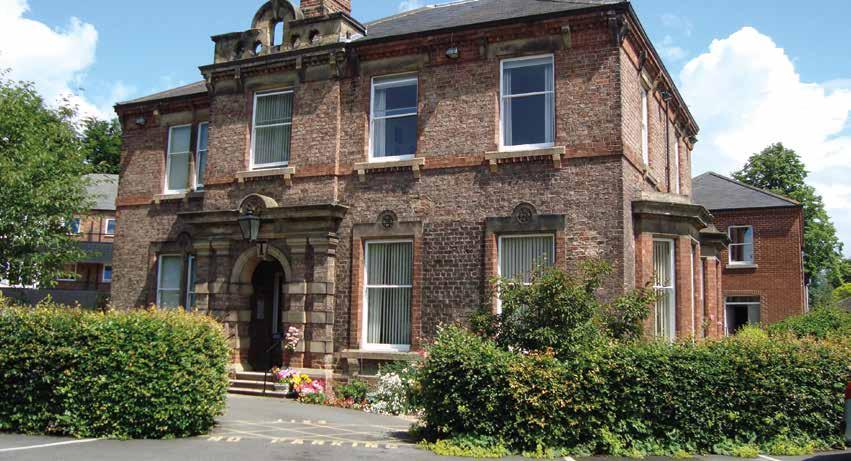
Your own affordable accommodation combined with a professional, dedicated and caring team. Our house is home to 12 residents, with en suite bedrooms which are privately furnished to your own taste. Two rooms share a kitchen for making breakfast and refreshments. Two home cooked meals are available each day plus food provided for breakfast.
There is an elegant communal lounge and dining room, and we offer a range of social activities. Wifi is available throughout the house and we have a visiting hairdresser and chiropodist.
24 hour alarm system is provided, with a door entry system and CCTV for additional security. Cleaning and laundry can be arranged.
The Team at Abbeyfield Northallerton CIO have enhanced their health-care skills through a national award scheme
Our team all hold Level 2 Certificates in Understanding Dignity and Safeguarding in Adult Health and Social Care, along with First Aid Skills meaning your support team are trained in the most up to date way; keeping your safety and dignity at heart.
Abbeyfield Northallerton CIO sets the bar very high in terms of the service they provide for their residents and these qualifications increase their skills and capabilities in all the key areas.
Offering a home from home environment, whilst keeping your independence within a supported house; with it comes companionship, safety and security.
Sheltered, retirement or warden-assisted housing all describe accommodation provided specifically for older people. Schemes usually have the services of a warden, support worker or scheme manager, though increasingly this person lives off-site, or the service is provided as ‘floating support’, with regular visits from a member of staff.
Each property has an alarm system so that residents can summon help in an emergency. You can get information about sheltered housing in your area from your local district council housing department (see page 77).
Most leasehold sheltered/retirement housing is purchased at full price on the open market. However, some organisations operate arrangements for people to purchase their housing. Typically, these are the following.
A small number of housing associations offer the option of buying a share of a property and paying rent on the remainder. A service charge may have to be paid in addition to the rent. You may be eligible for Housing Benefit to help with paying your rent. Sometimes, people can purchase a higher proportion and then not have to pay any rent.
All schemes are different but usually, when you leave, the apartment will be sold on the open market (subject to the purchaser being an older person with a need to live at the scheme). Some housing associations do offer a buy back option, but not all.
Close care housing is a term used to describe various models of older people’s housing where there is sheltered and/or retirement accommodation linked to, or on the same site as, a care home.
These are run by a small number of housing associations and usually require you to buy 70% of a property, the remaining portion being owned by the housing association. When you sell, you receive 70% of the market value of the property.
This product offers an arrangement where you buy the right to live in a retirement property for the rest of your life (or lives in the case of a couple). The price is well below the normal purchase price but once you leave the property it reverts back to the company. Lifetime leases are available to people aged 60 and over. Lifetime leases may also be available for non-retirement properties.
With an interest-only mortgage you borrow a lump sum against the value of a property and your monthly repayments will only pay off the interest of that loan. The original lump sum will need to be paid, in full, at the end of the term or when you sell the property. There are reputable financial organisations that can help you with this type of product.
When considering using this type of organisation, you should ensure the company is regulated by the Financial Conduct Authority (FCA). See page 54 for financial organisations that can offer advice on these and other financial products. You will also find information about how to find an independent financial adviser.
For information on close care housing, contact your local council’s housing department or the Elderly Accommodation Counsel (EAC), now part of FirstStop Advice. See page 78.

Are you happy living at home? Would you like a little more independence with help when you need it? Would you like to explore alternative housing options? For example:
• If your home is specially adapted and you receive the support needed, you may prefer to stay at home. It’s also convenient if your college or job is nearby.
• Move into supported housing – this offers the chance to live independently. Supported housing is usually for people with disabilities who need housing-related or care-related support. You can have your own tenancy and will live independently but may choose to share with other people. Support and care services will be tailored to your needs. Supported housing is also designed to promote independence and reduce social isolation.
• Rent a place – you can apply for council social housing, which is usually more affordable than renting privately. There could be a waiting list and you must fully explain your housing needs and income situation. Local housing associations
If you have a learning disability, you may have considered moving out of your family home. You may want to have your own home with support or share a property with other people, with support provided for everyone. The support may include learning independent living skills like cooking, cleaning, travel training and money management as well as help with health needs.
Moving into your own home can often give you greater independence and choice and we want more people to have access to these options. There are other alternatives too, such as Adult Placement or Shared Ownership schemes that could be considered and we can help to set these up with you.
For more information on housing options, please contact our Customer Service Centre. Contact details are on page 5.
People with learning disabilities can also use Personal Budgets to pay for their support if they are eligible. For more details, please see page 56.
Our social care workers and NHS community nurses who specialise in learning disability will be able to give you information to support you to make the right choices.
Your local GP or Community Learning Disabilities
may also be able to help; you can ask your council housing department for a list of these. If you want to rent privately, look in your local newspaper for ‘To Let’ advertisements or online (there are websites that provide listings of properties available for rent or sale). If you are eligible, you might be able to receive Housing Benefit or Direct Payments to help with the cost of your rent; ask your local authority for details and see page 56.
• Buy your own home – this will need careful consideration. Can you afford it? Are you able to live on your own? You could think about ‘part-buying’ and ‘part-renting’ a home from a housing association.
Team (CLDT) should be your first point of contact if you have health needs. You can ask your GP to refer you or ask someone who knows you to contact the CLDT on your behalf.

Covering all of Yorkshire, we pride ourselves on delivering specialist unique bespoke care and support to those with challenging behaviours and learning disabilities from the comfort of their own home.
Our professional holistic services are uniquely tailored to each individual to ensure they retain their independence for as long as they are able to.
We also provide quality, person-centred supported living care to individuals with dementia and mental health conditions.
Following an assessment of your needs, you may be eligible for help from us, including a Personal Budget, Occupational Therapy, adaptations to your home, supported housing or help for the person caring for you.
You may want some voluntary work or support to find a paid job. Our employment pathways web page may be able to support you. You can see this information on our website; visit: www.northyorks.gov.uk and search for ‘supported employment’.
The sensory service comprises Sensory Social Workers, Communicator Guides for people with dual sensory impairment, Rehabilitation Officers for people who are visually impaired and a Sensory Service Team Manager. All job functions work together closely to provide a comprehensive sensory service. The Sensory Service Team is countywide, covering North Yorkshire. The team’s specialist training and experience means it understands the impact of sensory loss and applies that as it works with you.
If you need equipment to help overcome difficulties resulting from your sensory loss, we can offer advice and information and signpost you to the options available to you.
Some of the social care staff within the Sensory Service Team are skilled in British Sign Language (BSL) and understand the cultural differences involved in being a Deaf person in a hearing world. These staff have experience of working with people who are Deaf and whose first language is BSL.
The team can undertake social care assessments and provide or arrange services for people who are eligible following an assessment. This may include help with:
• Using local community services.
• Managing practical daily living.
• Making decisions and keeping safe.
The support you require if you have a physical disability or learning disability will be tailored to your specific needs and can be provided by the independent and not-for-profit sectors as well as by North Yorkshire County Council. Where you are eligible for Health and Adult Services’ support, help at home with personal care is available if this is needed. There are also private agencies offering help at home with personal care and housework. See page 25 for more information.
• Overcoming communication barriers.
• Work and/or education.
• Social isolation.
• Mental health conditions.
The terms ‘deafblind’ or ‘dual sensory loss or impairment’ refer to people who have a combined vision and hearing impairment.
We have a dedicated team that provides specialist support for people with a dual sensory impairment. The team can undertake social care assessments and provide or arrange services depending on eligibility following an assessment.
The support considered will depend on the individual and the outcome of their assessment but will usually aim to help the person to access communication, information and mobility on either a short- or long-term basis.
If you have been diagnosed with a visual impairment, we will receive notification of this through a Certificate of Visual Impairment from your eye health consultant. We keep a register of these certificates and offer advice, information and support relating to the concessions available once registered. An assessment can be offered to people who are on the register.
for further assistance with your search for care
For people not registered but whose visual impairment still has a significant impact on their independence, we can still provide an assessment.
We also offer a rehabilitation service, which can help you to maintain or rediscover your independence, both at home and in the community. Rehabilitation may involve learning to use a long cane; learning
We work in partnership with health trusts and other organisations throughout the county to provide specialist mental health services to support people affected by mental health illness.
Mental health illness can affect anyone at any time and one in four people will experience some form of mental illness during their lifetime. There are many types of mental illness, from mild difficulties to more severe and enduring conditions. Some examples include abuse and neglect; addiction; anxiety; depression; eating disorders; stress; and trauma.
Your GP should be your first point of contact if you are worried about your mental health. Your GP may be able to treat you or refer you to your local Community Mental Health Team (CMHT).
If you are experiencing difficulties with your mental health and would like some support, contact one of
Dementia affects everyone differently and can cause a wide range of symptoms. These can include problems with memory, thinking, concentration and language. People may become confused or struggle with how they perceive things.
Dementia can also cause changes in mood or emotions and affect how someone behaves.
Your GP is usually the first point of contact if you are experiencing memory problems. The GP may make a referral to the memory assessment service to help with formal diagnosis.
Following a formal diagnosis of dementia, your GP may refer you to a specialist, like a consultant
skills to work independently in the kitchen; or learning how to use special equipment for reading and tasks such as shopping and paying bills.
This service is usually provided to enable people to become as independent as possible for as long as possible before we consider any need for long-term support in response to vision loss.
the following local services.
Helpline for those struggling with emotional wellbeing.
Tel: 01423 856799
Samaritans
If you need urgent support or feel suicidal, call the Samaritans.
Tel: 116 123
Tees, Esk and Wear Valleys NHS Foundation Trust
Tel: 0800 051 6171
(North Yorkshire mental health emergency).
Web: www.tewv.nhs.uk/services/crisis-advice
There are lots of support organisations and charities that can also help people with mental health illness, for example, Mind; contact details are on page 78.
in old age psychiatry, a community nurse or an Occupational Therapist (OT) with a special interest in dementia care.
As it can be best for a person with dementia to remain living in their own home for as long as possible, a range of community care services is available to facilitate this. Dementia support services, funded by us, can help newly diagnosed people and their carer to understand their condition and find support locally. When needed, help can be provided to access home care, meals in the home, sitting services (which provide a break for carers), advice on equipment and adaptations, day care centres and respite care.
Our dementia support services are provided by Dementia Forward across North Yorkshire. For further information, visit: www.dementiaforward.org.uk

These services can be provided directly by registered providers to those people who are not eligible for financial help from us. You may have a choice of which agency you receive your care from whether or not we assist with funding your service.
If you are considering moving to a new house, but do not need to move to a care home, extra care housing schemes can cater for people living with dementia, with Limestone View in Settle offering specialist support to people with dementia. For more details regarding extra care housing, go to page 58.
People with dementia can benefit from a range of group or individual therapies involving social interaction and mental stimulation, including reminiscence. The dementia support services can help you find local activities. Activity co-ordinators and OTs can provide people with dementia with different therapies or types of support. Approaches that promote understanding of the behaviour of the person with dementia can also be beneficial and trained staff can offer this service within many care establishments.
See page 50 for more information on paying for care homes in North Yorkshire.
Avery Healthcare offers a safe and supportive environment where residents can flourish, make new friends, maintain contact with their local communities and live a life of possibility.
• Residential, dementia, and respite care


• Nutritionally balanced seasonal menus
• Spacious, beautifully decorated bedrooms
• Safe visits for family and friends
• Stimulating schedule of daily activities and entertainment
• Highly trained staff teams
Amarna House Care Home York | 01904 376334
averyhealthcare.co.uk
If you are considering a care home with nursing, see the checklist on page 71.
Somerset House provides the kind of care we’d want all of our loved ones to receive. If you’re concerned about how your relative is coping and would like them to have more support, Somerset House provides family-led care in a friendly and homely environment. Our residents enjoy a wide range of meaningful activities and nutritious homecooked meals.
Many people who currently choose to go into a care home could continue to live in their own home with the right level of support. Anyone who feels they need an assessment to find out what their specific needs are can ask us for one. This includes people who may have sufficient money to pay for their own care. We will work with you to ensure that this is the right option for you.
We can provide advice and information on many services, including equipment and adaptations,
Care homes (personal care only)
If you need someone to look after you 24 hours a day, but don’t need nursing care, a care home offering personal care may be the best option. Personal care includes bathing, feeding, dressing and help with moving.
If you are considering a care home, you may wish to speak to us to ensure this is the best option for you. There may be alternative ways that you can be supported to remain independent in your own home.
If you think you may need nursing care in a home, you will need to be visited by a social care worker or a care manager to work out what care you will need. This visit might be in your own home, or in hospital if you’ve been ill, or in a care home.
Sometimes people choose to live in another area of the country as they want to be closer to friends and family. This can be in different types of accommodation, including supported living or simply renting. Each individual situation is different and, therefore, how it is funded will be assessed differently.
If you do require a care home placement to meet your needs and you qualify for local authority financial assistance, the county you lived in before you moved to the care home is responsible for arranging your support.
Assistive Technology and alarm systems to help you stay in your own home for as long as possible.
If your assessment shows that a care home is the best option, we can give you information about the range of homes available to meet your assessed needs. If you are not eligible for financial assistance from us, you will need to consider which homes you can afford. If you choose an expensive home and use up all your savings, you may then have to move to a different care home.
You will be fully involved in planning your care needs. If a care home providing nursing care is the best way to meet your needs, your social care worker will give you information to help you find a home which meets your care requirements. The cost of the nursing care part of your fees is paid by the NHS to the home directly. You can contact the Nurse Care Management Team for your area at your local Integrated Care Board listed on page 77.
All care providers in the country must be registered and inspected by the Care Quality Commission (CQC), which reports on its findings and awards quality ratings. Inspection reports and quality ratings are available from the provider or from the CQC: www.cqc.org.uk along with the quality ratings. Further information about the CQC can be found on page 76.
The home you choose must be suitable for your assessed needs and comply with the terms and conditions set by the authority.
You can contact the Care Quality Commission through its website: www.cqc.org.uk where you will find details of all registered care homes in the UK.
Alternatively, this Guide’s website: www.carechoices.co.uk has details of all registered care providers in England.





Everyone deserves uncompromising care. That’s the passionate belief of the experts in our care homes.
That’s why you’ll find our people are well-trained in a variety of skills. They’re dedicated people who want to celebrate life and improve well-being. And it’s why support is given with kindness, respect and dignity.
These are the things that mean the most. And because they matter to you, they matter to us.
barchester.com/nyk











We suggest that you take paper with you when visiting care homes so that you can make notes. You can download and print this checklist at: www.carechoices.co.uk/checklists
What is the minimum number of staff that are available at any time?
Are staff respectful, friendly and polite?
Do staff have formal training?
Are the staff engaging with residents?
Can you get involved in activities you enjoy?
Is there an activities co-ordinator?
Does the home organise any outings?
Are residents escorted to appointments?
Do the residents seem entertained?
Does the home have a varied activities schedule?
Is the home adapted to suit your needs?
Can you bring your own furniture?
Are there enough plug sockets in the rooms?
Are there restrictions on going out?
Is there public transport nearby?
Does the home provide any transport?
Can you make/receive calls privately?
Can you decide when to get up and go to bed?
Does the home allow pets?
Does the home use Digital Care Planning accessible to families?
Is the home too hot/cold? Can you control the heating in your room?
Is the décor to your taste?
Are there restricted visiting hours?
Is there somewhere you can go to be alone?
Does the home feel welcoming?
Can the home cater for any dietary requirements you may have?
Does the menu change regularly?
Can you eat when you like, even at night?
Can you have food in your room?
Is there a choice of food at mealtimes?
Is alcohol available/allowed if you want it?
Can visitors join you for meals?
Do your fees cover all of the services and activities?
Are fees likely to change regularly?
Is the notice period for cancellation of the contract reasonable?
Could you have a trial period?
Can you keep your room if you go into hospital?
Can you handle your own money?
*See page 76.
BURLINGTON CARE
BURLINGTON CARE STRIVES TO MAKE SURE THERE IS ALWAYS A HOME-FROM-HOME FEELING WITHIN ALL OF OUR CARE HOMES.

Burlington Care has been providing High Quality Person Centred Care for older people since 2007. We are proud to be considered one of the UK’s leading, care providers and have luxury residential, nursing & dementia care homes across Yorkshire, North Lincolnshire, Nottinghamshire & The North East.
Burlington Care provide exceptional residential, nursing & dementia care, in Quality settings where loved ones can join us for Long Term, Short-term or Respite care allowing time to simply rest and recover when required.

Castle Grange
Tel: 01723 413164
Email: info@castlegrange.co.uk
16A Dean Road, Scarborough YO12 7SN
Crystal Court
Tel: 01423 810627
Email: info@crystalcourt.co.uk
Pannal Green, Pannal, Harrogate HG3 1LH
Burlington care homes are a place where our residents, families & friends enjoy a sense of home and belonging. Through innovation, creativity, and the use of industry leading technology Burlington Care Homes deliver happiness, love and friendship daily, to ensure residents enjoy a rich, inspiring and fulfilling life.
Maple Court
Tel: 01723 413413
Email: info@maplecourt.co.uk
182 Barrowcliff Road, Scarborough YO12 6EY
Maple Lodge
Tel: 01748 831000
Email: info@maplelodgecarehome.co.uk


Low Hall Lane, Catterick DL9 4LJ

Sutton Hall and Lodge
Tel: 01535 635329
Email: info@suttoncare.co.uk
Corn Mill Walk, Sutton-in-Craven, Keighley BD20 7EN
www.burlingtoncare.com

We suggest that you take paper with you when visiting care homes so that you can make notes. Please use this checklist in conjunction with the care homes checklist on page 71. You can download and print this checklist at: www.carechoices.co.uk/checklists
Are there clear signs throughout the home?
Has the home been designed or adapted for people with dementia?
Are the home and grounds secure?
Are there prompts outside the residents’ rooms to help people identify their own?
Is the décor familiar to your loved one?
Do residents get a choice in terms of what they wear each day?
Are residents encouraged to be independent?
Can residents decide what to do each day?
Can residents have a say in the décor of their room?
Are residents able to join in with household tasks like folding washing?
Are there activities on each day?
Can residents walk around outside on their own?
Are residents sitting in front of the TV or are they active and engaged?
Are there rummage boxes around?
*See page 76.
Can residents get help with eating and drinking?
How often does the home review residents’ medication?
Does the home offer help if a resident needs assistance taking medication?
Do GPs visit the home regularly?
Are staff trained to identify when a resident might be unwell?
Are staff trained to spot when someone needs to go to the toilet?
Do the staff have any dementia-specific training/experience?
Will your loved one have a member of staff specifically responsible for their care?
Does the home follow a specific approach to dementia therapy, for example, validation therapy?
Will the home keep you informed about changes to your loved one’s care?
Does the home have a specific approach to end of life care?
Does the home keep up to date with best practice in dementia care?
The DBS provides a joined-up, seamless service combining the criminal records checking and barring functions.
The DBS can bar a person unsuitable to work with vulnerable people, including children, from working in regulated activity in the future. If a person is barred, it becomes an offence for an organisation to knowingly engage that person in regulated activity.
Employers and volunteer managers of people working in ‘regulated activity’ have a legal duty to make referrals to the DBS in certain circumstances.
Advocacy services help people to speak for themselves. They offer a confidential, free and independent service provided by trained advocates. Sometimes, you may need an independent advocate to help and support you through a difficult time in your life, or to support you if you feel you are not getting the services or help you need. The type of advocacy service you may receive will depend on your needs and circumstances.
In accordance with the Care Act 2014, local authorities must arrange an independent advocate to support you to be involved in the assessment process, in making your care and support plan, and in the safeguarding process if you meet both of the
The local authority also has the power to make a referral and should do so where it is necessary.
Regulated activity is work – both paid and unpaid –with children or vulnerable adults that meets certain criteria.
The full up-to-date guidance and definitions must be referred to when deciding whether to make a DBS referral.
For disclosure information and services, visit the DBS homepage: www.gov.uk/dbs
following criteria:
• You would have substantial difficulty in being fully involved in these processes.
• There is no appropriate individual available to support and represent your wishes. This person cannot be involved in your care and support in a paid capacity and must be appropriately trained and supported to fulfil this role.
If you meet the above criteria, a referral will be made to our Independent Advocacy Service –Cloverleaf Advocacy. There are two specialist advocacy services in North Yorkshire that you may wish to contact directly – see page 10.
If you use a home care agency or move into a care home, you should feel able to comment on any aspect of your life which affects your happiness or comfort. This might be anything from the way you are treated by staff to the quality of the food you are served. You should also feel free to make suggestions about possible improvements to your surroundings and the services provided.
Making a comment, compliment or complaint should not be made difficult for you and should
not affect the standard of care that you receive, whether in your own home or in a care home or care home with nursing. Care services are required under national Essential Standards of Quality and Safety to have a simple and easy-to-use complaints procedure. A friend or relative can make a comment on your behalf if we have your agreement to the complaint being made and you give consent for us to share your information with them. Or you can ask someone, for example an independent advocate, to support you to make the complaint yourself.
If you are concerned about the care that you, a friend or a relative are receiving, you should contact the registered manager/owner of the service in the first instance as they have a duty to respond to any complaints made about their service. The problem may be resolved quite easily once they are made aware of it.
If you are unhappy with the response from the service provider and your care has been arranged and funded by the local authority, you should discuss your concerns with your social care worker or contact our Complaints Team using the following details as we may be able to look into your complaint further.
Tel: 01609 532638
Email: social.complaints@northyorks.gov.uk
Write to: Health and Adult Services Complaints Manager, North Yorkshire County Council, County Hall, Northallerton DL7 8DD
We aim to resolve complaints as quickly and informally as possible. If you can talk to the
A solicitor can give you impartial advice about wills, making gifts, estate planning and powers of attorney. Some can also offer guidance on immediate and long-term care plans, ensuring (if applicable) the NHS has made the correct contribution to your fees.
Lasting Powers of Attorney (LPAs) allow you to appoint someone you trust to make decisions about your personal welfare, including healthcare and consent to medical treatment, and/or your property and financial affairs. An LPA is only valid once registered with the Office of the Public Guardian. It allows for a person of your choice to make decisions on your behalf at a time when you may be unable.
The Court of Protection can issue Orders directing the management of a person’s property and financial affairs if they are incapable of managing their own affairs should they not have an LPA. The Court procedure is presently very slow, and the fees are quite expensive, so preparing an LPA is always advisable, providing you have somebody sufficiently trustworthy to appoint as your attorney.
managers who deliver your service, this is often the quickest and best way to get a problem resolved. If you are unhappy with our response to your complaint, you can contact the Local Government and Social Care Ombudsman for further advice.
If you have arranged and funded your care without our involvement and you are unhappy with the response to your complaint by the service provider, you can contact the Local Government and Social Care Ombudsman for advice. The Local Government and Social Care Ombudsman looks at complaints about councils and some other authorities and organisations including adult social care providers (such as care homes and home care providers). Its helpline is open from 10.00am to 4.00pm, Monday to Friday on: 0300 061 0614. Visit: www.lgo.org.uk
If you have concerns about a breach of regulations by a registered provider, you can contact your local office of the Care Quality Commission which can use the information when looking at individual services to ensure quality and safety standards are being met. See page 76 for more information.
An ‘advance directive’ allows you to communicate your wishes in respect of future medical treatment, but it is not legally binding. You may instead wish to make a living will, properly known as an ‘advance decision’ setting out treatment that you do not want to receive in specified circumstances, which would legally have to be followed, even if you die as a result.
Any proposed gift out of your estate needs careful consideration of the benefits, risks and implications, particularly on any future liability for care costs or tax liability.
If you don’t have your own solicitor, ask family or friends for their recommendations. Contact several firms, explain your situation and ask for an estimate of cost and an idea of timescales involved. Many firms will make home visits if necessary and will adapt their communications to meet your needs. It’s important to find a solicitor who specialises in this area of the law. Citizen’s Advice offers an advice service and will be able to recommend solicitors in your area. Visit: www.citizensadvice.org.uk
Health and social care services must be registered to show that they meet a set of standards. The Care Quality Commission (CQC) is the independent regulator of health and social care in England. It registers care providers and inspects and rates services. When things go wrong, the CQC can also take action to protect people who use services.
After an inspection of a care home or home care agency, the CQC publishes a report of what it found. The report looks at how well the service meets the CQC’s five key questions: Is the service safe? Effective? Caring? Responsive to people’s needs? Well led?
Each care home and home care agency will get an overall rating of outstanding, good, requires improvement or inadequate. It will also get ratings for each key question. The ratings mean you can
Palliative care
Palliative care refers to the services provided for people affected by a life-limiting illness when there is no cure or treatment, to try to make the end of a person’s life as comfortable as possible and to provide dignity at this difficult time. This will include relieving pain and other symptoms whilst providing psychological and social support to the person who is ill and to their carers and family.
Patients can receive palliative care in their own home or a preferred place of care (such as a hospice, care home with nursing or hospital). Patients and their carers should talk to their GP, district nurse or hospital doctor about their needs.
End of life care is an important part of palliative care and usually refers to the care of a person during the last year of their life. Some people who are nearing the end of their life will be eligible for funded healthcare called ‘Continuing Healthcare’ and there is a fast-track assessment process to provide a quick response to their needs.
easily see where a service is performing well, and where it needs to improve.
It’s always a good idea to check inspection reports and ratings when choosing a care service. You can find reports and ratings on the CQC’s website (www.cqc.org.uk). Care providers must also display their latest rating at their premises and on their website.
You can also tell the CQC about your experiences of care – good or bad. It can use your information to see where it should inspect next, and what to look out for when it does. If you want to share your experience of care, visit: www.cqc.org.uk/share
Tel: 0300 061 6161
Email: enquiries@cqc.org.uk
Web: www.cqc.org.uk
Write to: The Care Quality Commission, Citygate, Gallowgate, Newcastle upon Tyne NE1 4PA
Losing a loved one is hard enough without the stress of making endless contacts to inform people. Tell Us Once is a service to make it easier for families to notify some government departments about the changes to their circumstances.
When you make an appointment to register a death in North Yorkshire, you will be offered this service during the death registration, and it will mean that you can just tell us once and we will notify the organisations that participate in the service.
More information, including the contact details you need for our registration offices in North Yorkshire, can be found at: www.northyorks.gov.uk/death or you can contact our Customer Services Centre on: 01609 780780
www.myfamilyourneeds.co.uk
For parents and carers of children with additional needs and those who support them.
North Yorkshire County Council Customer Service Centre
Tel: 01609 780780
Adult Social Care Complaints
Tel: 01609 532638
Email: social.complaints@northyorks.gov.uk
Emergency Duty Team
Tel: 01609 780780
Email: edt@northyorks.gov.uk
Humber and North Yorkshire Health and Care Partnership – Integrated Care Board (ICB) Health House, Grange Park Lane, Willerby HU10 6DT
Email: hnyicb-hull.hnycontactus@nhs.net
Web: www.humberandnorthyorkshire.icb.nhs.uk
North Yorkshire
Patient Relations, 1 Grimbald Crag Court, St James Business Park, Knaresborough HG5 8QB
Tel: 01609 767607
Email: hnyicb-ny.patientrelations@nhs.net
York
NHS Patient Relations, West Offices, Station Rise YO1 6GA
Tel: 01904 555999
Email: hnyicb-voy.patientrelations@nhs.net
District councils
Craven District Council
Tel: 01756 700600
Email: contactus@cravendc.gov.uk
Web: www.cravendc.gov.uk
Hambleton District Council
Tel: 01609 779977
Email: info@hambleton.gov.uk
Web: www.hambleton.gov.uk
Harrogate Borough Council
Tel: 01423 500600
Email: customerservices@harrogate.gov.uk
Web: www.harrogate.gov.uk
Richmondshire District Council
Tel: 01748 829100
Email: enquiries@richmondshire.gov.uk
Web: www.richmondshire.gov.uk
Ryedale District Council
Tel: 01653 600666
Web: www.ryedale.gov.uk
Scarborough Borough Council
Tel: 01723 232323
Web: www.scarborough.gov.uk
Selby District Council
Tel: 01757 705101
Email: info@selby.gov.uk
Web: www.selby.gov.uk
Useful national contacts
Al-Anon Family Groups
Worried about someone’s drinking? Help and hope for families and friends of alcoholics.
Helpline: 0800 008 6811 (10.00am to 10.00pm).
Email: helpline@al-anonuk.org.uk
Web: www.al-anonuk.org.uk
Alcoholics Anonymous (AA)
AA is concerned solely with the personal recovery and continued sobriety of individual alcoholics who turn to the Fellowship for help.
Tel: 0800 917 7650
Web: www.alcoholics-anonymous.org.uk
Alzheimer’s Society
The charity provides support for anyone concerned about someone experiencing memory loss or dementia.
Dementia Connect
support line: 0333 150 3456
Web: www.alzheimers.org.uk
Care Quality Commission
The independent health and adult social care regulator. Its job is to make sure health and social care services provide people with safe, effective, compassionate, high-quality care and encourage them to improve.
Tel: 0300 061 6161 • Web: www.cqc.org.uk
A website service allowing you to search by postcode or region for care homes, care homes with nursing and home care providers that meet your requirements across the country.
Web: www.carechoices.co.uk
Cruse Bereavement Care
This is a national organisation providing information and bereavement support.
Tel: 0808 808 1677 • Web: www.cruse.org.uk
Dementia Adventure
Provides supported holidays for people with dementia as an alternative to traditional respite where partners, family, friends or carers can enjoy an outdoor break together. Holidays are usually five days long, can be bespoke, are subsidised and are available to anyone across the UK.
Tel: 01245 237548
Email: info@dementiaadventure.co.uk
Web: www.dementiaadventure.org
An independent, impartial and free service offering advice and information to older people, their families and carers about housing and care options for later life. • Tel: 0800 377 7070
Email: info@firststopadvice.org.uk
Web: www.firststopadvice.org.uk
Mankind
This is a national organisation providing information and support to men suffering from domestic abuse. Tel: 01823 334244
Web: www.mankind.org.uk
Mind
A confidential mental health information service. It will be able to advise you of your nearest local Mind, run by local people, for local people. The service provides support like counselling, advocacy, housing and more.
Tel: 0300 123 3393 (info line).
Web: www.mind.org.uk
The lifestyle site for families, carers and practitioners supporting children and young adults with additional needs.
Web: www.myfamilyourneeds.co.uk
A confidential helpline for anyone in the UK concerned about drug use
Tel: 0300 123 6600 • Web: www.talktofrank.com
Information about local health services and health conditions • Web: www.nhs.uk
A music and dementia charity based in Glasgow and covering the whole of the United Kingdom. Its aim is to ensure everyone living with dementia has access to a personalised playlist and for everyone who meets them to be aware of it. The charity offers free advice and resources to anyone affected by dementia who could benefit from the power of music. Tel: 0141 404 0683
Email: info@playlistforlife.org.uk
Web: www.playlistforlife.org.uk
Relate
Relationship counselling.
Web: www.relate.org.uk
Samaritans
Tel: 116 123 • Web: www.samaritans.org
SANE
A telephone helpline for people affected by mental illness. • Tel: 0300 304 7000 (4.00pm to 10.00pm, 365 days a year). • Web: www.sane.org.uk
Produces a number of guides on housing issues, covering topics such as housing rights, housing benefits, private tenants’ rights and tenancy agreements. Shelter also runs a free housing advice helpline.
Tel: 0808 800 4444 • Web: www.shelter.org.uk
The Silver Line is the only free confidential helpline providing information, friendship and advice to older people, open 24 hours a day, every day of the year. The Silver Line aims to combat loneliness in over65s by providing friendship, information and advice through calls to trained volunteers.
Tel: 0800 470 8090
Web: www.thesilverline.org.uk
Stroke Association Helpline
The Stroke Association supports stroke survivors and their family members, friends and work colleagues or people who want to know how to prevent a stroke.
Tel: 0303 303 3100 • Email: helpline@stroke.org.uk Web: www.stroke.org.uk
Women’s Aid (National Domestic Violence Helpline)
The national charity for women and children working to end domestic abuse.
Tel: 0808 200 0247 • Web: www.womensaid.org.uk
Veterans’ Gateway
Support for you and your family if you are a veteran. Includes seeking support in healthcare, housing, employability, finances, personal relationships and more.
Tel: 0808 802 1212 • Text: 81212 Web: www.veteransgateway.org.uk (live chat available).
This list is a selection of venues offering day care services across the county. Due to COVID-19, many centres have had to adapt their services, such as moving online. In some cases, centres have had to temporarily or permanently close. Every effort has been made to check the accuracy of the following information. However, it is subject to change during the lifetime of this Guide. For the latest information, costs and opening times, please contact services individually.
Abbey Residential Home, The Malton Tel: 01653 531432
Alne Hall
York Tel: 01347 838295
Avalon
Harrogate Tel: 01423 530053
Basics Plus
Scarborough Tel: 01723 863143
Boot Shop, The Easingwold Tel: 01347 823242
Bridge, The Catterick Garrison Tel: 01748 832271
Claro Enterprises
Harrogate Tel: 01423 885879
Dales Centre
Bedale Tel: 01677 425806
Dalewood Trust
Whitby Tel: 01947 600583
Gift People, The Knaresborough Tel: 01423 864007
Glusburn Institute Community and Arts Centre
Glusburn Tel: 01535 630223
Harrogate Skills 4 Living
Harrogate Tel: 01423 593719
Henshaws Arts and Crafts
Knaresborough Tel: 01423 541888
Horticap Ltd
Harrogate Tel: 01423 522876
Jennyruth Workshops
Ripon Tel: 01765 606620
Just The Job Environmental Enterprise
Richmond Tel: 01748 822815
Lister House
Ripon Tel: 01765 694740
Mencap Scarborough Tel: 01723 374819
Mind
Harrogate Tel: 01423 503335
Northdale Horticulture
Northallerton Tel: 01609 770269
Open Arms
Selby Tel: 01757 211214
Open Country PD/LD Activities
Harrogate Tel: 01423 507227
Orb Community Enterprise
Knaresborough Tel: 01423 202028
Orchard House
Scarborough Tel: 01723 378220
Purple Patch Arts
Leeds Tel: 07510 330105
Ripon Community Link Ltd (Ripon Walled Garden)
Ripon Tel: 01765 609229
Skipton and Craven Action for Disability (SCAD)
Tel: 01756 701005
Libraries
North Yorkshire County Council’s Libraries offer a range of services and events; visit: www.northyorks.gov.uk/libraries to find out more information about a library in your area.
We deliver books, audiobooks, music CDs, DVDs and information to the homes of people who find it difficult to get to their local library.
Teams of volunteers deliver the books once a fortnight. You can also arrange for your own volunteer to collect your books from the library, or we can choose books to suit your tastes and keep them ready for collection.
You may be eligible for the free home delivery service if you cannot visit the library or carry books because of ill health or disability, or if you are a carer. We deliver to people who live in residential and nursing homes, too. All delivery volunteers have been checked by the Disclosure and Barring Service (DBS). You can email: libraries@northyorks.gov.uk, phone: 01609 533800 or contact your local library to join. You may use the service on a temporary basis, such as only in winter or when recovering from an illness or operation.
Barlby Library and Community Hub
Howden Road, Selby YO8 5JE
Bedale Community Library
2 North End DL8 1AA
Saint Cecilia’s
Scarborough Tel: 01723 502410
Thirsk Community Care
Tel: 01845 523115
Town and Country Care
– Happy Days
Whitby Tel: 01947 606187
Trinity Centre
Whitby Tel: 01947 601548
Yatton House Society
Great Ayton Tel: 01642 722380
Bentham Community Library
Pioneer Projects, Looking Well Studios, King Street, High Bentham LA2 7HG
Bilton and Woodfield Community Library
Woodfield Road (in the grounds of Woodfield Primary School), Harrogate HG1 4HZ
Boroughbridge Community Library and Resource Centre
17 St James Square, York YO51 9AR
Catterick Community Library
Gough Road, Catterick Garrison DL9 3EL
Colburn Community Library
The Broadway, Catterick Garrison DL9 4RF
Crosshills – South Craven Community Library
Main Street, Keighley BD20 8TQ
Derwent Valley Bridge Community Library
3 Pickering Road, West Ayton, Scarborough YO13 9JE
Easingwold Community Library
Marketplace, York YO61 3AN
Eastfield Community Library – More Than Books
High Street, Scarborough YO11 3LL
Embsay-with-Eastby Community Library
The Institute, Main Street, Skipton BD23 6RE
Filey Library
Station Avenue YO14 9AE
Gargrave and Malhamdale Community Library
Gargrave Village Hall, West Street, Skipton BD23 3RD
Grassington Hub and Community Library
Garrs Lane, Skipton BD23 5AT
Great Ayton Discovery Centre
105b High Street, Middlesbrough TS9 6NB
Harrogate Library
Victoria Avenue HG1 1EG
Hawes Library and Customer Service Centre
The Neukin, Marketplace DL8 3RA
Helmsley Community Library
Town Hall YO62 5BL
Ingleton Community Library
Ingleborough Community Centre, Main Street, Carnforth LA6 3HG
Kirkbymoorside Library – CLIC @ Kirkbymoorside Church House, 7 High Marketplace, York YO62 6AT
Knaresborough Library
Marketplace HG5 8AG
Leyburn Community Library
Thornborough Hall DL8 5AB
Malton Library
St. Michael Street YO17 7LJ
Mashamshire Community Library
Mashamshire Community Office, Little Market Place, Masham HG4 4DY
Newby and Scalby Library and Information Centre
450 Scalby Road, Scarborough YO12 6EE
Nidderdale Plus Community Library
Station Square, King Street, Pateley Bridge HG3 5AT
Northallerton Library
1 Thirsk Road DL6 1PT
Norton HIVE and Community Hub Commercial Street, Malton YO17 9ES
Pickering Library
The Ropery YO18 8DY
Richmond Community Library 10A Queen’s Road DL10 4AE
Ripon Library
The Arcade HG4 1AG
Scarborough Library
Vernon Road YO11 2NN
Selby Library 52 Micklegate YO8 4EQ
Settle Community Library
Limestone View, Lower Greenfoot BD24 9RB
Sherburn And Villages Community Library
Finkle Hill, Sherburn-in-Elmet LS25 6EA
Skipton Library High Street BD23 1JX
Starbeck Community Library
Starbeck Central, 68A High Street, Harrogate HG2 7LW
Stokesley Community Library – The Globe Town Close, North Road TS9 5DH

Tadcaster Community Library Station Road LS24 9JG
Thirsk Community Library
Meadowfields, Chapel Street YO7 1TH
Whitby Library
Windsor Terrace YO21 1EY








Situated alongside the canal on the outskirts of Skipton with fabulous views overlooking the Aire Valley, the Home is built using traditional Yorkshire stone and set amid landscaped gardens. We offer accommodation for up to 68 residents, including respite care, with all bedrooms equipped with en suite bathrooms, fitted furniture and elegantly decorated. Our dedicated well trained, professional team offer an exceptionally high standard of general nursing, dementia and palliative care.
Located in a peaceful leafy residential suburb in Steeton, Keighley, surrounded by beautiful gardens with trees and wildlife whilst having excellent facilities. Comprising of four community areas for up to 65 residents, including respite care, we offer a genuine, friendly, small community feel that everyone feels part of. Our outstanding team offer general nursing and palliative care, as well as a memory lane community offering specialised care for those living with dementia.
Set in beautiful grounds in the heart of Silsden, we have lovingly restored and modernised this spectacular building to offer residential care for 41 residents, including respite and palliative care, including a specialist dementia unit. We pride ourselves on offering a high standard of care tailored to each individual's ever changing needs. Our stylish and practical spaces mean our resident's can relax, socialise and live as independently as possible whilst enjoying the unique and luxurious setting.



We’re here to help make your search for a care home easier. In our home, you can expect a safe, welcoming environment, where we encourage independence while offering a helping hand. We get to know everyone, offer a range of sociable activities, and most of all, a place to call home.

At Towerview Care, we find new and better ways to help people with complex care needs live their own lives. We see people as individuals: we want to realise each person’s potential to enjoy life, spent with people they like and love, whatever their circumstances. Our homes are welcoming, relaxed and happy places to live and make new friends.
Our highly trained multidisciplinary teams strive to provide care and a life that’s full of choices and opportunities for our ladies and gentlemen. We’re open to new ideas to continually improve on our clinical and wellbeing standards so those we care for achieve great outcomes.
Asquith Hall is a purpose-built dementia specialist nursing home. Providing specialist care over two floors, with 53 single bedrooms with individual Ensuite bathrooms or wet rooms.

Long-term nursing care for people with dementia and complex mental health needs with behaviours that may challenge is focused on the ground floor. Care on the first floor centres around mental disorders and complex needs.
Our aim is to have zero crisis admissions back to the hospital for mental health care which to date has been achieved. For more information, please contact the registered manager or matron on 01706 811 900 or asquith-hall@towerviewcare.com
Pennine Lodge is a dementia-friendly care home specialising in caring for those with dementia, mental health disorders, or complex needs that may challenge in a warm and inviting Edwardian manor house.

There are three units, situated over two floors with 38 single Ensuite bedrooms. Many of those who live at Pennine Lodge grew up and have lived in Todmorden and surrounding areas for their whole lives. This means that it has a real community feel. People often become neighbours all over again and continue their lifelong friendships.
We are passionate about supporting our ladies and gentlemen to enjoy meaningful and stimulating activities and experiences every day. For more information or to arrange a visit, please contact our registered manager or the deputy manager on 01706 812 501 or pennine-lodge@towerviewcare.com.
Please visit our group website for more information about Towerview Care and the homes above: www.towerviewcare.com.
The positive approach to specialist care.
A beautifully extended and modernised Victorian home with original features, located only 3 miles from Bradford city centre. Brookfield has a choice of four different lounges and a conservatory with patio doors leading out into the gardens. Residents can eat in either of the two dining rooms, on the garden terrace or have their meals brought to them in their own rooms. Brookfield has a dedicated music centre and a library of books, computers, tablets and WiFi that residents can enjoy, all whilst being cared for by the wonderful team.
Tel: 01274 583 950
A beautiful and grand nursing home with an oak panelled lounge where residents can relax, socialise, take part in activities, watch TV or listen to music. The large conservatory has patio doors that lead to a fantastic terrace and gardens, and the home is immaculate inside and out.

High speed WiFi, unique personalised rooms and the very best levels of 24-hour nursing care all create a fabulous and safe environment.
Tel: 01535 653 204
Another grand building with delightful gardens, where residents and staff grow their own vegetables, Beanlands makes for a truly magnificent home. With two light-filled large lounges and a huge conservatory that offers views of the perfectly kept grounds, Beanlands Nursing



Home is a place where people can feel at home with 24-hour nursing care.
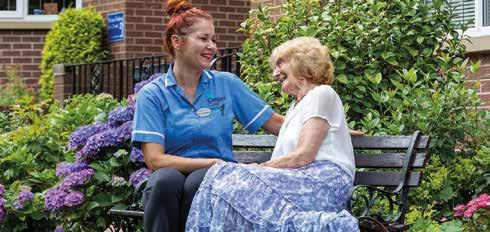
Tel: 01535 633 312
Providing 24-hour nursing care and fully equipped with all the latest medical equipment and adaptations, the nursing home is part of the wider Fairmount Park development which includes 37 retirement houses and apartments for the over 55s. The Clubhouse at Fairmont Park is on the doorstep offering a restaurant and bar, swimming pool, jacuzzi, fully equipped gym, steam room and snooker table. There are also regular bowls matches held on the crown bowling green.
Tel: 01274 592 922
Staveley Birkleas is a specialist nursing home taking residents from all over the North. It cares for young people from the age of 18 through to 64, who have a variety of needs including amputees, people with brain injuries, Multiple Sclerosis (MS), Motor Neuron Disease, Huntington’s, Epilepsy and many other complex conditions.
Tel: 01274 588 288
Czajka Care Group is a family run business that was established in Saltaire in 1983. From its five West Yorkshire care and nursing homes it offers quality permanent and respite care to older people, as well as running its specialist home for younger people with a variety of disabilities.
All of Czajka Care Group’s homes have the prestigious Gold Standard Framework accreditation, in recognition of its exceptionally high standards. They are also recognised as an Investors in People organisation, demonstrating commitment to developing staff and ensuring continuous improvement, as well as having impressive infection control ratings.

Ashfield (Skipton) (North Yorkshire County Council)
Carleton Road, Skipton BD23 2BG
Tel: 01609 534539
Beech Grove
Main Street, Sutton-in-Craven, Keighley BD20 7JS
Tel: 0208 327 1800
Carleton Court Residential Home Ltd
Carleton Road, Skipton BD23 2BE
Tel: 01756 701220
Cragmere – UBU
Colne Road, Glusburn BD20 8RB
Tel: 01535 635678
Daleholme – St Anne’s Community Services
Station Road, Settle, Craven BD24 9BN
Tel: 01729 825769
Gills Top
Scar Street, Grassington, Skipton BD23 5AF
Tel: 01756 668330 Advert page 88
Hurstfield
Keighley Road, Cowling, Keighley BD22 0LA
Tel: 01535 634313
Anley Hall Nursing Home
Skipton Road, Settle BD24 9JU Tel: 01729 822268
Beanlands Nursing Home
Colne Road, Cross Hills, Keighley BD20 8PL
Tel: 01535 633312 Advert page 84
Craven Nursing Home Ltd
Keighley Road, Skipton BD23 2TA
Tel: 01756 700994 Advert page 82
Dales, The Advert pages 68 & 69
Draughton, Skipton BD23 6DU
Tel: 01745 274 222
Ingleborough Nursing Home
1 High Street, Ingleton, Carnforth LA6 3AB
Jenkin Lodge
– St Anne’s Community Services
New Road, Ingleton, Carnforth LA6 3JL
Tel: 01524 241745
Jubilee Lodge
Carleton Road, Skipton BD23 2BE
Tel: 01609 535569
Malsis Hall
LDA MH SI YA
– Mental Health Rehabilitation Service
Malsis Drive, Glusburn, Keighley BD20 8FH
Tel: 01535 286240
Neville House
Neville Crescent, Gargrave, Skipton BD23 3RH
Tel: 01609 797438
Thornton Hill
Church Road, Thornton-in-Craven, Skipton BD23 3TR
Tel: 01282 792806 Advert page 88
Townend Close
Victoria Road, Crosshills, Keighley BD20 8SZ
Tel: 01535 634639 OP D
Malsis Hall
– Mental Health Rehabilitation Service
Malsis Drive, Glusburn, Keighley BD20 8FH
Tel: 01535 286240 OP MH YA
Milton House Nursing and Residential Home
Marton Road, Gargrave, Skipton BD23 3NN
Tel: 01756 748141 OP YA
Sutton Hall and Lodge
Cornmill Walk off Sutton Lane, Sutton-in-Craven, Keighley BD20 7EN
Tel: 01535 635329 Advert page 72 OP D SI YA
Threshfield Court Advert pages 68 & 69
Station Road, Threshfield, Skipton BD23 5ET
Tel: 01756 611 572 OP D PD YA
Tel: 01524 241593




Hambleton care homes
Benkhill Lodge
38 Benkhill Drive, Bedale DL8 2ED
See page 85 for the Service User Bands key
Oaklands
Tel: 01677 422407 OP D YA
Copperclay Mews
Copperclay Walk, Easingwold, York YO61 3QN
Tel: 01302 866906 LDA YA
Hambleton Grange
Station Road, Thirsk YO7 1QH
Tel: 01845 523837 Advert page 86 OP D
Leeming Bar Grange Care Home
Leeming Lane, Leeming Bar, Northallerton DL7 9AU
Tel: 01677 628 301 Advert pages 68 & 69 OP D PD
Millings, The
5 North End, Bedale DL8 1AF
Tel: 01677 423635 OP
Northfield House
Stockton Road, Knayton, Thirsk YO7 4AN
Tel: 01845 537964 LDA YA
Alne Hall
– Care Home with Nursing Physical Disabilities


Alne, York YO61 1SA
Tel: 01347 838295
OP PD LDA YA
59b Leeming Lane, Leeming Bar, Northallerton DL7 9RR
Tel: 01677 988010 LDA YA
Royal Mencap Society – 2 Conroy Close
Easingwold, York YO61 3NS
Tel: 01347 821488 LDA
Sowerby House
Front Street, Sowerby, Thirsk YO7 1JP
Tel: 01845 525986 Advert page 93 OP D PD YA
St Catherine’s Care Home
1 East Lane, Shipton by Beningborough, York YO30 1AH
Tel: 01904 470644 OP D YA
Valley Road
– Resource Centre
65a Valley Road, Northallerton DL6 1SH
Tel: 01609 533394 OP PD LDA SI
Bedale Grange Care Home
28 Firby Road, Bedale DL8 2AS
Tel: 01677 422980 OP
Peacock Manor provides nursing care for up to 49 residents, both older and younger, with a range of needs. The care staff care for older people and those with challenging behaviour caused by dementia or other conditions.
At Peacock Manor, their priority is providing the very best care for their residents, including all the facilities and amenities they need to enjoy a high quality of life. The homes are equipped with well stocked kitchens that provide fresh, healthy meals daily. The majority of rooms come with a TV, telephone and emergency call system as standard. The lounge and dining areas are kept spotless and they also have quiet areas and gardens for residents to relax in.
24/7 professional elderly care/nursing Nursing care is for people who need a qualified nursing care team available to them 24 hours a day. This might include people who need peg feeding, people who may have suffered a stroke and people with long term conditions.

Dementia care Family and friends of a person with dementia often find themselves struggling to cope. Although the thought of placing a loved one into a care home can be daunting for some, it can be the best option for both the person and their family. Peacock Manor provides specialised dementia care services.
Tel: 01423 330345
for further assistance with your search for care

Beechwood Care Home
Romanby Road, Northallerton DL7 8FH
Tel: 01609 777733
Greenwell House Care Home
7-9 Wycar, Bedale DL8 1ER
Tel: 01677 424012
Kensington Care Home
Finkills Way, Northallerton DL7 8UB
Tel: 07766 143110
Leeming Garth
Leeming Bar, Northallerton DL7 9RT
Tel: 01677 424014

Aire House
6 Westcliffe Grove, Harrogate HG2 0PL
Tel: 01423 509285
Avenue Knaresborough, 1 The
1 The Avenue, Knaresborough HG5 0NL
Mount Vale
Yafforth Road, Northallerton DL7 8UE
Tel: 01609 801 353 Advert pages 68 & 69 OP D MH YA
Oak Trees Care Home
Main Street, Alne, York YO61 1TB
Tel: 01347 838262 OP
Peacock Manor Nursing Home
Brotes lane, Boroughbridge Road, Whixley, York YO26 8BA Advert page 87
Tel: 01423 330345
Southwoods Nursing Home
OP D PD MH SI YA
28 Thirsk Road, Northallerton DL6 1PH
Tel: 01609 258288 OP D
LDA MH YA
Tel: 01423 546326 PD LDA SI YA
Avon Lodge and Avon Lodge Annex
24-25 Harlow Moor Drive, Harrogate HG2 0JW Tel: 01423 562625
LDA MH YA
Bethany House
3 Margarets Road, Harrogate HG2 0JZ
Tel: 01423 505401 LDA MH
Boroughbridge Manor and Lodge Care Home
Roecliffe Lane, Boroughbridge YO51 9LW
Tel: 01423 582 438 Advert pages 68 & 69
Boroughbridge Road – St Anne’s Community Services
67 Boroughbridge Road, Knaresborough HG5 0ND
Tel: 01423 869343
Borrage House
8 Borrage Lane, Ripon HG4 2PZ
Tel: 01765 618621 Advert page 88
Brackenley
33 Forest Lane Head, Harrogate HG2 7TE
01423 862230
Briardene
63 East Parade, Harrogate HG1 5LP Tel: 01423 562667
Caxton Lodge
10 North Road, Ripon HG4 1JP Tel: 01765 604418
Church Avenue Harrogate, 12 12 Church Avenue, Harrogate HG1 4HE Tel: 01423 546326
Crescent, The – St Anne’s Community Services 1 The Crescent, Green Hammerton YO26 8BW Tel: 01423 331440
Crest Care Home, The 32 Rutland Drive, Harrogate HG1 2NS Tel: 01423 563113
Disability Action Yorkshire – 34 Claro Road Harrogate HG1 4AU Tel: 01423 561911

Doublegates Green, 47 – United Response
Ripon HG4 2TS
Tel: 01765 607381
East Park Road Harrogate 2
2 East Park Road, Harrogate HG1 5QT
Tel: 01423 546326 OP
Ellershaw House Ltd
Bramley Grange, Grewelthorpe, Ripon HG4 3DJ
Tel: 01765 658381
Emmaus House
115 Valley Drive, Harrogate HG2 0JS
Tel: 0300 303 8450
Gables, The
Starbeck, Harrogate HG2 7NW
Tel: 01423 546326 PD LDA SI YA
Gatehouse, The
9 Manor Road, Harrogate HG2 0HP
Tel: 01423 535730
Greenacres
– St Anne’s Community Services
62 Harrogate Road, Ripon HG4 1SZ
Tel: 01765 606151
Heath Lodge
6 Pannal Ash Road, Harrogate HG2 9AB
Tel: 01423 882970
Highgate Park, 4 – United Response
Harrogate HG1 4PA
Tel: 01423 504506
Hookstone Chase Harrogate, 66
66 Hookstone Chase, Harrogate HG2 7HS
Tel: 01423 546326
Hyde Park House
10-12 Hyde Park Road, Harrogate HG1 5NR
Tel: 01423 509267
Kings Road Harrogate, 61
61 Kings Road, Harrogate HG1 5HJ
Tel: 01423 546326
Knaresborough Two Group
17 Park Way, 21 Farfield Avenue, Knaresborough HG5 9DP
Tel: 01423 868555 PD LDA SI YA
Larchfield Manor
Leadhall Grove, Leadhall Lane, Harrogate HG2 9NN
Tel: 01423 871077 OP D PD MH SI
Leeds Road, 66
– Foresight Residential Ltd
Harrogate HG2 8BG
Tel: 01423 815555 OP D PD LDA SI YA
Long Meadow Care Home
60 Harrogate Road, Ripon HG4 1SZ
Tel: 01765 607210 OP D MH YA
Manor House Harrogate, The
60 Cornwall Road, Harrogate HG1 2NE
Tel: 01423 594345 Advert page 90 OP D
Manor House Knaresborough, The
1 Hambleton Grove, Knaresborough HG5 0DB
Tel: 01423 594354 Advert page 90 OP D
Norfolk Road
– St Anne’s Community Services
28 Norfolk Road, Harrogate HG2 8DA
Tel: 01423 871288 LDA
Otley Road, 14
– Foresight Residential Ltd
Harrogate HG2 0DN
Tel: 01423 500700 PD LDA SI YA
Riverside Court
Bridge Street, Boroughbridge, York YO51 9LA
Tel: 01423 322935 OP D PD
Robert Street, 12
12 Robert Street, Harrogate HG1 1HP
Tel: 01423 546326 PD LDA SI YA
Sherburn House
Chain Lane, Knaresborough HG5 0AS
Tel: 01423 789790 OP D PD LDA SI YA

Hampden House is a purpose built care home located in the Duchy Estate of the elegant town of Harrogate in North Yorkshire who offers a home from home for discerning guests who appreciate comfort, quality and exceptional care.

One of a select group of care homes operated by Elizabeth Finn Homes, Halliwell offers personal and nursing care on a permanent or short stay basis, as well as end of life care, all to the same exceptional standard in our 56 ensuite rooms which all have views over the attractive landscaped gardens or courtyards.
The gardens – a haven of tranquillity and beauty – are well laid-out and provide a pleasant place to stroll and enjoy the fresh air. From awardwinning restaurant style dining to industry-leading social engagement, Hampden House provides the highest level of service and facilities.
Providing ‘exceptional care for the individual’ is at the centre of our ethos, where quality of life is as important as quality of care. We believe that residents should be given the freedom to choose how they live their lives wherever possible. Whatever the length of their stay, our mission is to ensure that all residents enjoy the best quality of life possible. Care is as much about providing outstanding care as it is about ensuring that the individual feels safe, secure, valued and happy.



Shieling, The
58 Harlow Moor Drive, Harrogate HG2 0LE
Tel: 01423 508948
Skell Lodge
South Crescent, Ripon HG4 1SN
Tel: 01765 602530
Spring Mount Harrogate, 8
8 Spring Mount, Harrogate HG1 2HX Tel: 01423 546326
Spring Mount Harrogate, 16 16 Spring Mount, Harrogate HG1 2HX
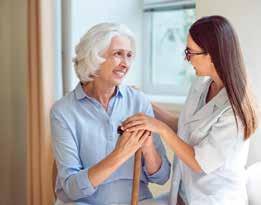
Apley Grange
35 Oatlands Drive, Harrogate HG2 8JT Tel: 01423 885101
Ashfield Court – Harrogate
3 Tewit Well Road, Harrogate HG2 8JG
Tel: 01423 560175 Advert page 51
Belmont House Care Home
High Street, Starbeck, Harrogate HG2 7LW
Tel: 01423 580884 Advert page 51
Berwick Grange
14 Wetherby Road, Harrogate HG2 7SA
Tel: 01423 880194
Bilton Hall Nursing Home
Bilton Hall Drive, Harrogate HG1 4DW
Tel: 01423 869131 Advert opposite
Coach House Nursing Home, The Dishforth Road, Sharow, Ripon HG4 5BQ
Tel: 01765 600541
Crystal Court
Pannal Green, Pannal, Harrogate HG3 1LH
Tel: 01423 810627 Advert page 72 OP D
Granby Rose SDU
Highgate Park, Harrogate HG1 4PA
Tel: 01423 582709 Advert page 70 OP D
St Johns House
Parker Lane, Kirk Hammerton YO26 8BT Tel: 01423 330480
Station View 16 Station View, Harrogate HG2 7JB
01609 533003
Sunningdale House 103-105 Franklin Road, Harrogate HG1 5EN Tel: 01423 569191
Westfield House Care Home Ripon Road, Killinghall, Harrogate HG3 2AY
Advertisers are highlighted
Grosvenor House Care Home
39 Duchy Road, Harrogate HG1 2HA
Tel: 01423 523447
Hampden House
OP D PD MH SI YA
120 Duchy Road, Harrogate HG1 2HE
Tel: 01423 566964 Advert page 92 OP
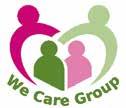
We Care Group (WCG) is celebrating over 15 years of excellence, each WCG home provides a safe, happy and homely environment for residents to live in. We’re proud to provide personalised care with dignity, choice and independence to around 1035 individuals who live in our homes. We train and develop more than 1400 caring staff to deliver high standard round-the-clock care and support.
1400+ EMPLOYEES
1000+ RESIDENTS 25 NURSING & CARE HOMES Harrogate care homes continued See page 95 for the Service User Bands key
Granby, The Granby Road, Harrogate HG1 4SR
Tel: 01423 586992 Advert page 70 OP PD
Harcourt
Henshaws
Lister
Sycamore
Thistle
Richmondshire care homes with nursing

Maple
Rosedale Nursing Home
The Old Vicarage, Catterick Road, Catterick Garrison DL9 4DD
Abbey Residential Home, The Town Street, Old Malton, Malton YO17 7HB
Tel: 01653 531432
Alba Rose
Keld Head Hall, Middleton Road, Pickering YO18 8NR
Tel: 01751 472754
Arden House Residential Home Recreation Road, Pickering YO18 7ET
Tel: 01751 473569
Grayling
Back Lane South, Middleton, Pickering YO18 8NU
Tel: 01751 477209
Hall Residential Home, The Chestnut Avenue, Thornton-le-Dale, Pickering YO18 7RR
Tel: 01751 474789
Beechwood Place Nursing Home
50-52 Welham Road, Norton, Malton YO17 9DP
Tel: 01653 692641
Aelred Wing at St Hilda’s Priory, The Castle Road, Whitby YO21 3SL
Tel: 01947 899560
Ashurst Residential and Care Home
36-38 Westbourne Park, Scarborough YO12 4AT
Tel: 01723 360392
Briar Dene Residential Care Home
75 Burniston Road, Scarborough YO12 6PH
Tel: 01723 361157
Isabella Court
72a Westgate, Pickering YO18 8AU
Tel: 01751 475787
North Yorkshire County Council – 5 Whitby Road
5 Whitby Road, Pickering YO18 7HD
Tel: 01751 473369
Omega Oak Barn
High Lane, Beadlam, York YO62 7SY
Tel: 01439 771254
Prospect House Care Home
Gate Helmsley, York YO41 1JS
Tel: 01759 373607
Rockingham House
22 The Mount, Malton YO17 7ND
Tel: 01653 697872
Wintofts Residential Home
Lendales Lane, Pickering YO18 8ED
Tel: 01751 475233
YA
Advertisers are highlighted
Rivermead
123 Scarborough Road, Norton-on-Derwent, Malton YO17 8AA OP D PD YA
Tel: 01653 472201 Advert pages 68 & 69
Caedmon House
2 Crescent Avenue, Whitby YO21 3EQ
Tel: 01947 600430 LDA
Castle Grange
16a Dean Road, Scarborough YO12 7SN
Tel: 01723 413164 Advert page 72 OP D YA
Derwent Cottage
27 Eastgate, Seamer, Scarborough YO12 4RB
Tel: 01723 866146 OP LDA YA
Dulverton
Eagle
Eden
Marina Lodge
46 Victoria Avenue, Scarborough YO11 2QT Tel: 01723 361262
42 Esplanade, Scarborough YO11 2AY Tel: 01723 360053
Milestone House
Milestone House, Eastgate,
Esk Hall Care Home
George Edward Smart Homes
Gladstone
Jubilee
Respite and Recovery Centre
St Hildas Business Centre, The Ropery, Whitby YO22 4ET
Tel: 01947 600779
Rockfield Residential
22-24 New Queen Street, Scarborough YO12 7HJ
Tel: 01723 361019
Rowan House
128 Columbus Ravine, Scarborough YO12 7QZ
Tel: 01425 485520
Sabre Court
4 Lonsdale Road, Scarborough YO11 2QY
Tel: 01723 361256
Scarborough Hall and Lodge Care Home
Mount View Avenue, off Seamer Road, Scarborough YO12 4EQ
Tel: 01723 821 322 Advert pages 68 & 69
Silver Birches
Station Avenue, Filey YO14 9AH
Tel: 01723 513563
St Cecilia’s Care Home
19-21 Stepney Road, Scarborough YO12 5BN
Tel: 01723 503111
Stakesby Road
89 Stakesby Road, Whitby YO21 1JF
Tel: 01947 602452
Whitby Scheme, The
14-15 Crescent Avenue and 2-5 North Promenade, Whitby YO21
Abbey Lea Care Home
York Road, Barlby, Selby YO8 5JP
Tel: 01757 213811
Carentan House
Brook Street, Selby YO8 4AU
Tel: 01757 702815
Denison House Care Home
3 Denison Road, Selby YO8 8DA Tel: 01757 703884
Firth House
18 Firth Mews, Millgate, Selby YO8 3FZ
Tel: 01757 213546
Grange, The 28 Leeds Road, Selby YO8 4HX
Tel: 01757 210221
Hambleton Court Care Home

19-21 Station Road, Hambleton, Selby YO8 9HS
Tel: 01757 228117
Heathcotes (Whitley)
Whitley Farm Cottages, Doncaster Road, Whitley Bridge DN14 0HZ
Tel: 01977 663476
Heathcotes Garmsway
Garmsway, Doncaster Road, Whitley, Goole DN14 0HY
Tel: 01977 663591
Hilltop Manor Care Home Ltd
15 Finkle Hill, Sherburn-in-Elmet, Leeds LS25 6EB
Tel: 01977 683898 Advert below
Lodge, The Landing Lane, Hemingbrough, Selby YO8 6RA
Tel: 01757 428131 PD LDA SI YA
Specialise in Residential Dementia Care
Lodge, The Milford Lodge, Westfield Lane, South Milford, Leeds LS25 5AW
Tel: 01977 235080 LDA YA
Meadow Lodge Care Home
Broach Lane, Kellington, Goole DN14 0ND
Tel: 01977 662899 OP D
Orchard, The Garman Carr Lane, Wistow, Selby YO8 3UW
Tel: 01757 268646 LDA
Preceptory Lodge
Temple Hirst, Selby YO8 8QN
Tel: 01757 270095 OP LDA YA
Riccall House Care Home
78 Main Street, Riccall, York YO19 6QD Tel: 01757 248586 OP D
Sunnyborough
Weeland Road, Eggborough, Goole DN14 0RX
Tel: 01977 661717 LDA MH YA
Tawny Lodge Brook Street, Selby YO8 4AL
Tel: 01609 534393 OP D PD LDA SI YA
Temple Manor
Temple Hirst, Selby YO8 8QN Tel: 01757 270377 OP D
Vicarage, The 21 Church Avenue, Selby YO8
Westwood
15 Finkle Hill, Sherburn-in-Elmet, Leeds, North Yorkshire LS25 6EB
Tel: 01977 683898 Fax: 01977 685567
Email: enquiries@hilltopmanorcare.co.uk
For most of our lives we enjoy the security, privacy, independence and the comfort that comes from living in our own homes. Here at Hilltop Manor we specialise in residential dementia care in designed accommodation offering care, privacy, independance and security.
Our staff are our greatest asset, we have a dedicated qualified team whose commitment is to ensure that the residents’ wellbeing and comfort is top priority.
If you are considering a care home with nursing, see the checklist on page 71.
Care Choices Limited has taken every care to ensure that the information contained in this Guide is accurate at the time of print. The company cannot accept responsibility for any errors or omissions in the publication, including if an organisation varies from the information included in an advertisement, the editorial or the listings. Care Choices Limited does not endorse or support any particular organisation included in the Guide. ©2023 Care Choices Limited. Care Choices Limited reserves all rights in the titles Care Choices and HOMES Directories and their design.
Care Choices™ is a trademark of Care Choices Limited.
Ref. No: 4001/NYorks11/0123. Reproduction of any part of this publication in any form without the written permission of Care Choices Limited is prohibited.
Published by: Care Choices Limited, Valley Court, Lower Road, Croydon, Nr Royston, Hertfordshire SG8 0HF. Tel: 01223 207770.
Director of Policy and Communications: Jo Dovey.
Director of Sales: David Werthmann.
Editors: Olivia Hubbard, Angharad Burnham.
Lead Editor: Henry Thornton.
Content Editor: Aislinn Thompson.
Sales Manager: Paul O’Callaghan.
Regional Sales Supervisor: Vanessa Ryder.
Senior Sales Executives: Hannah O’Neill, Tony Boyce, Susan Speaight.
Director of Creative Operations: Lisa Werthmann.
Studio Manager: Jamie Harvey.
Lead Designer: Ruth Keating.
Graphic Designers: Rebecca Mendil, Patrycja Radzka, Tyler Smith.
Distribution: Gemma Seaber-Shinn.

We cover all of Yorkshire and pride ourselves on delivering bespoke care and support to those with learning disabilities from the comfort of their own home.
Our professional services are uniquely tailored to each individual to ensure they retain their independence for as long as they are able to.
We also provide quality, person-centred elderley care to individuals with dementia and mental health conditions
Specialist care categories include:
• Dementia
• Learning disabilities
• Mental health conditions
• Physical disabilities
• Sensory impairment
Tel: 0330 127 1848 www.unityplus.co.uk

